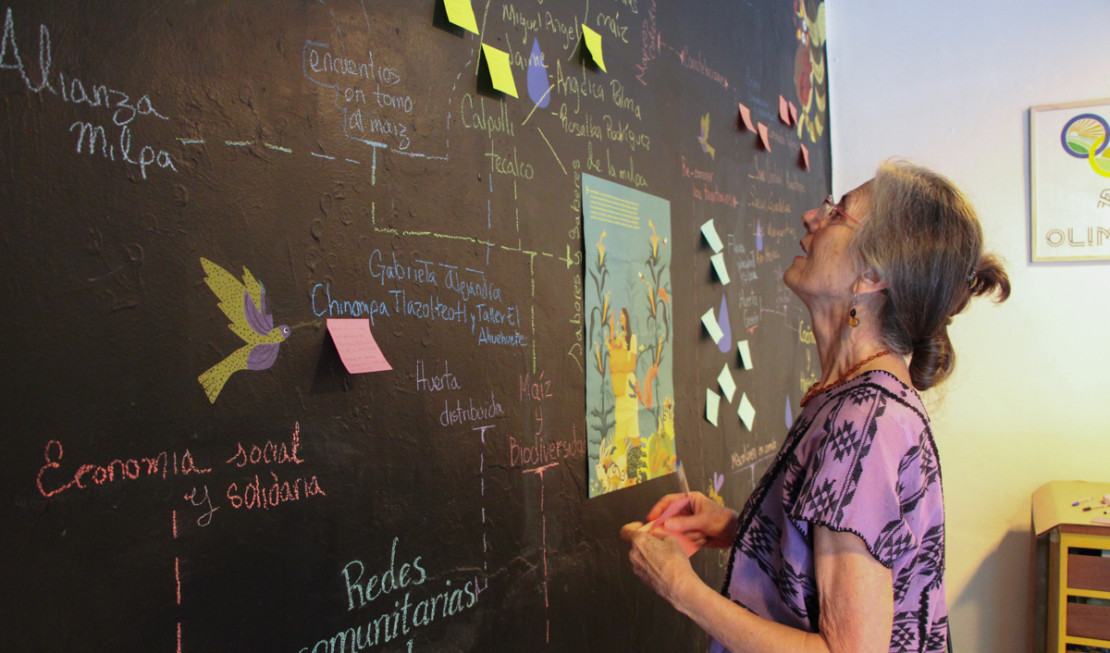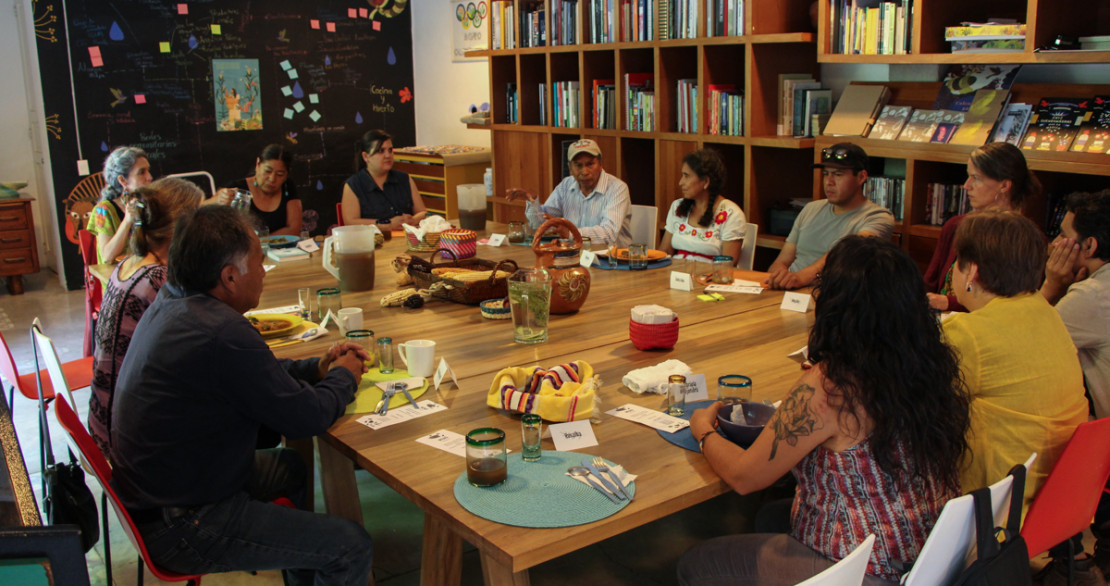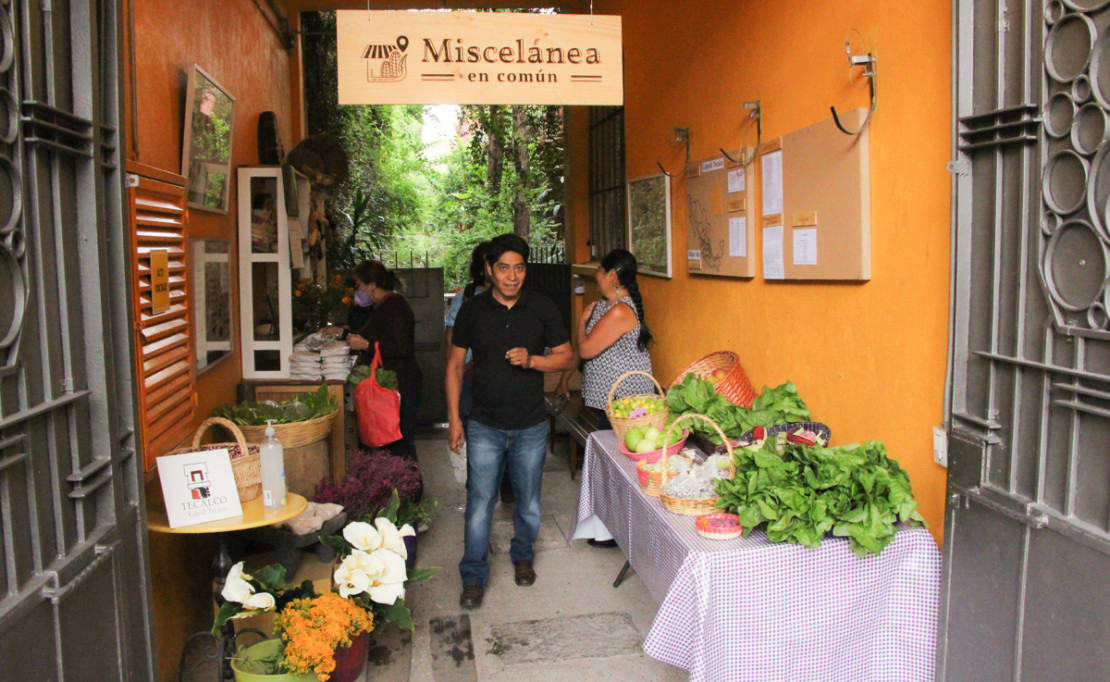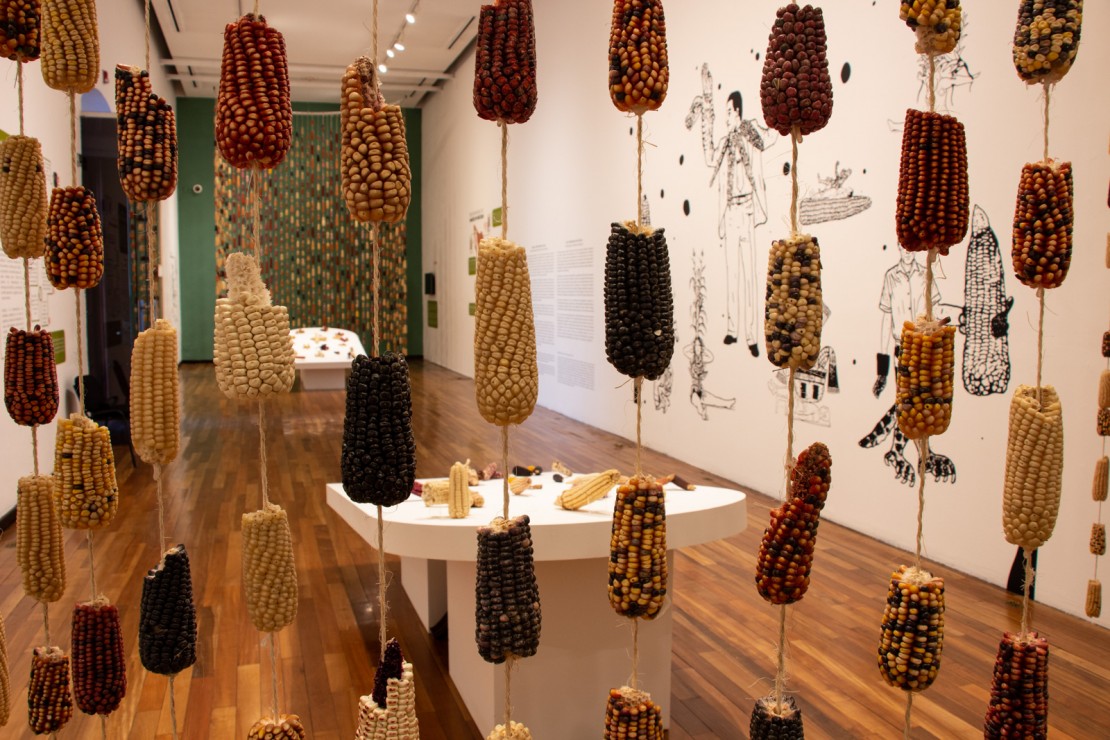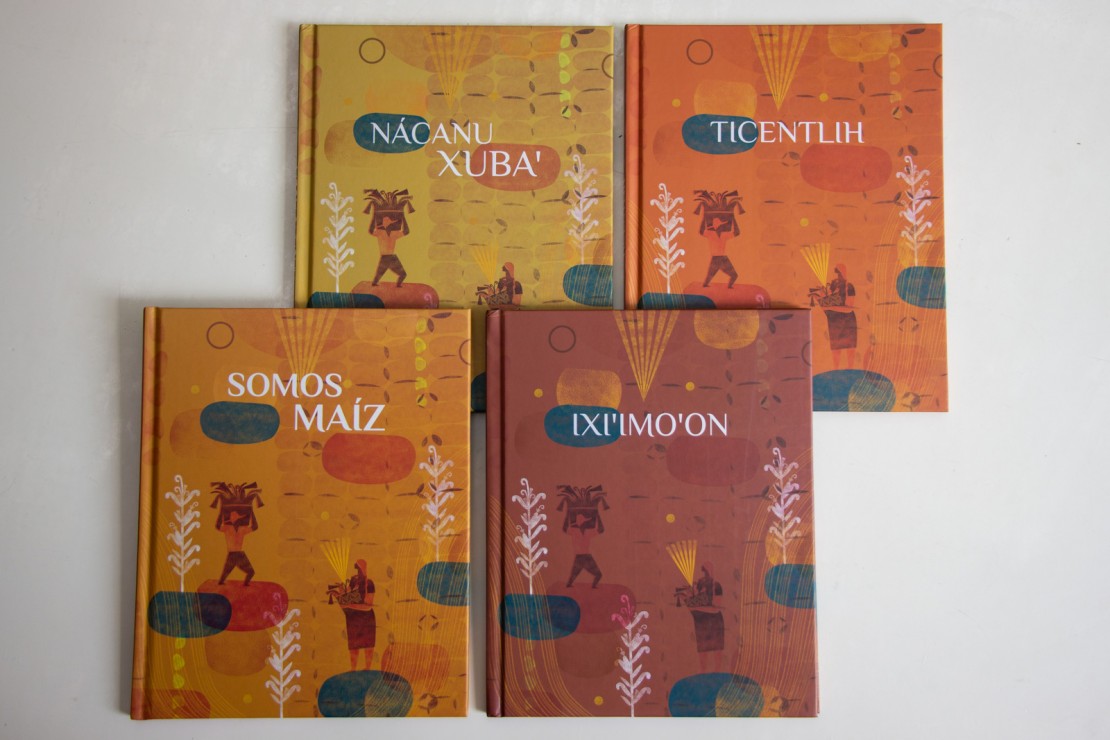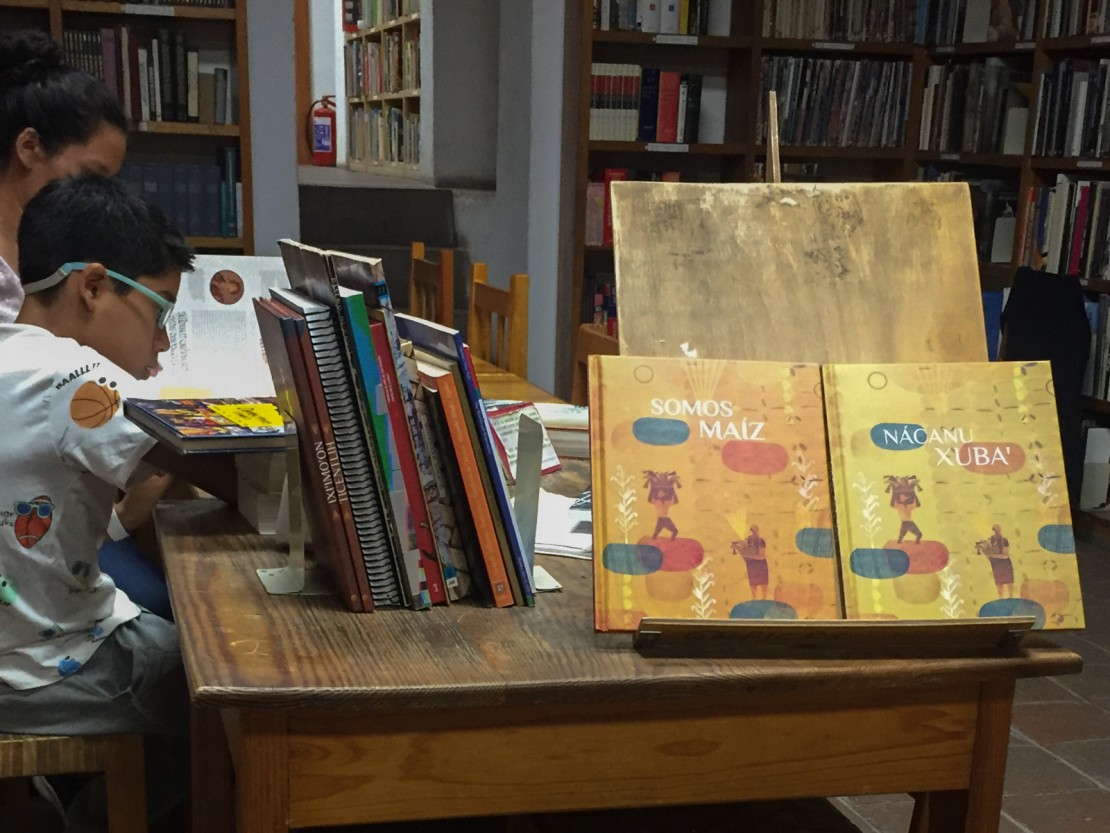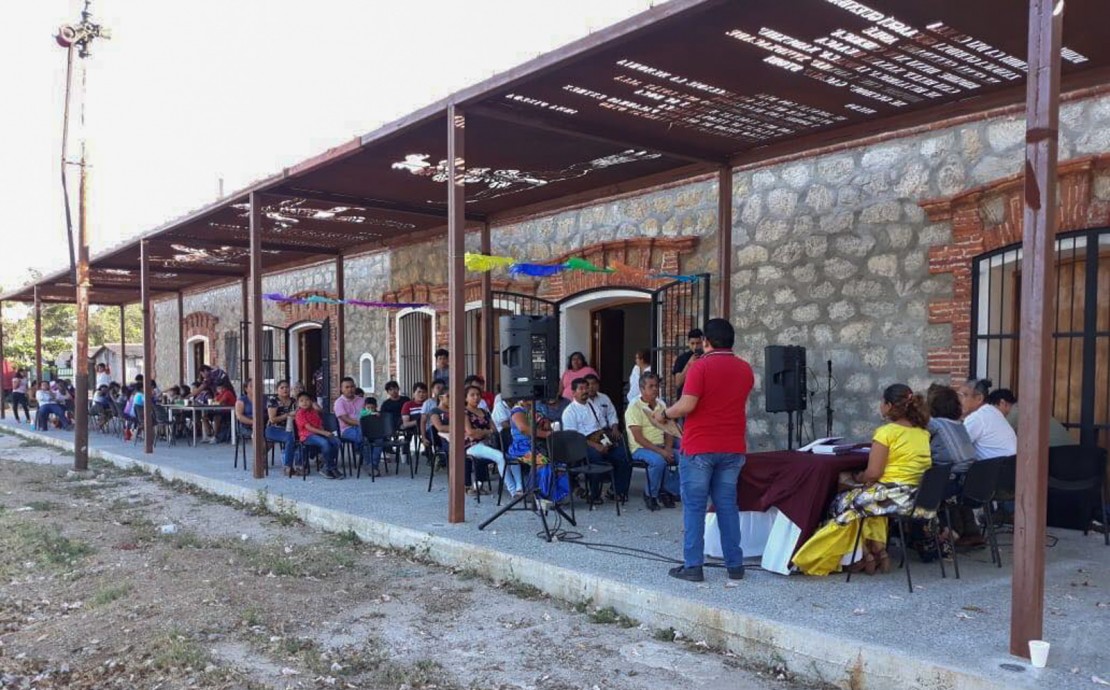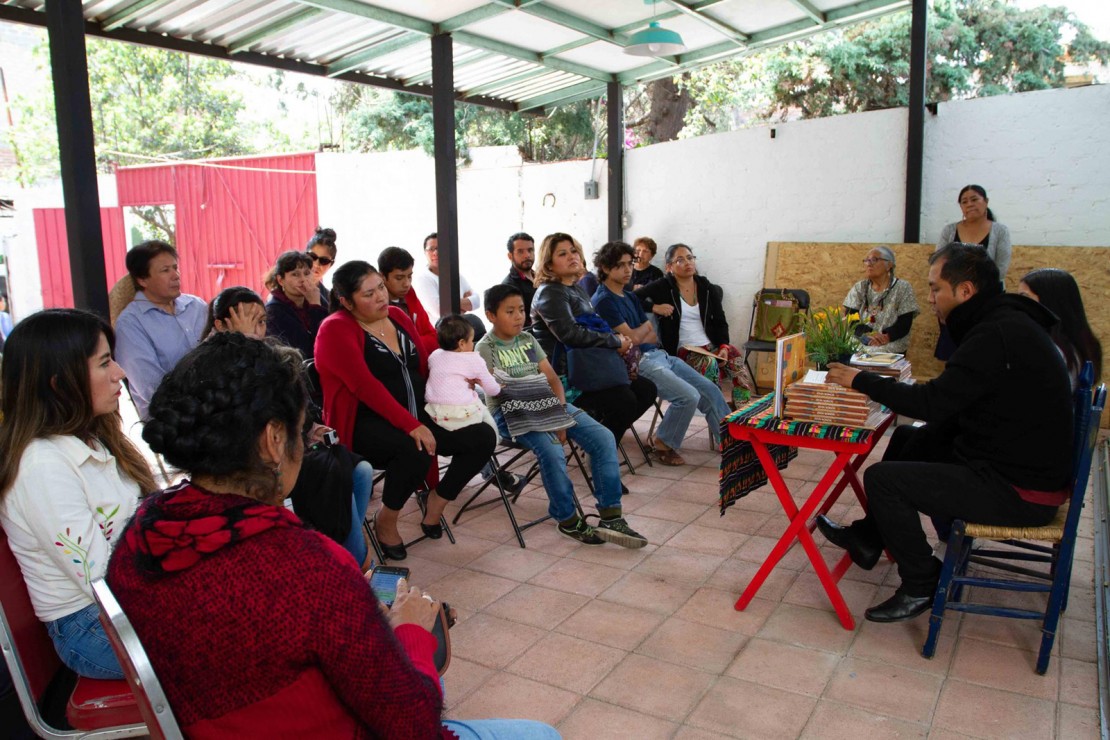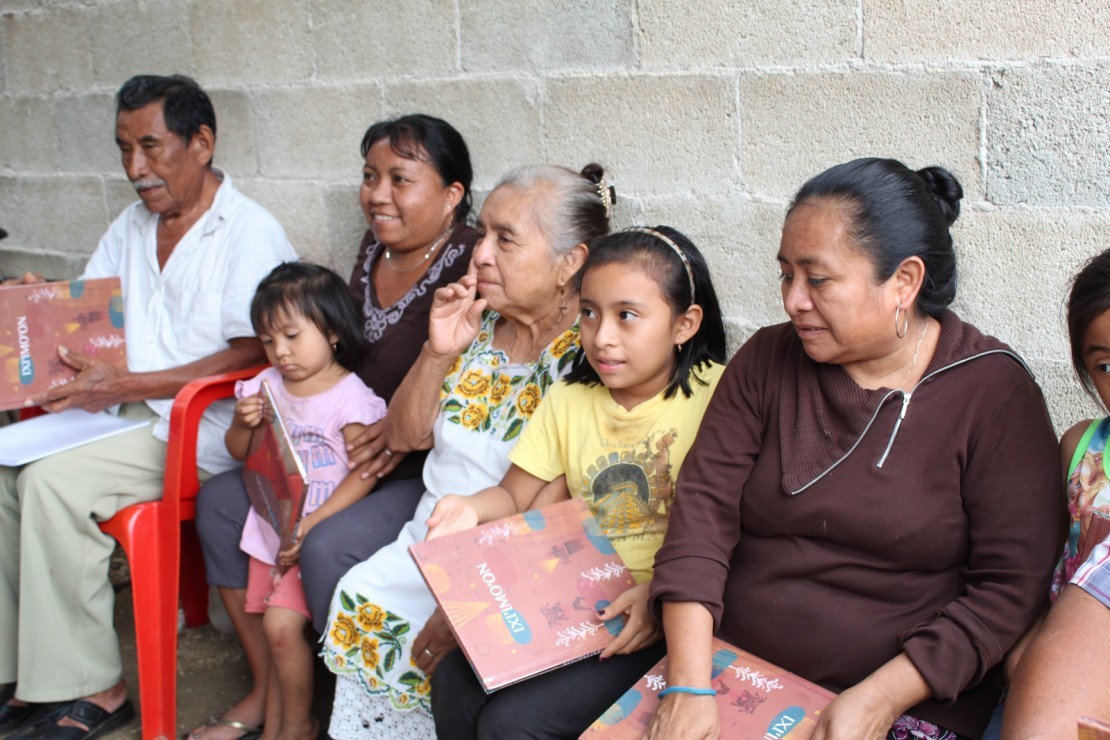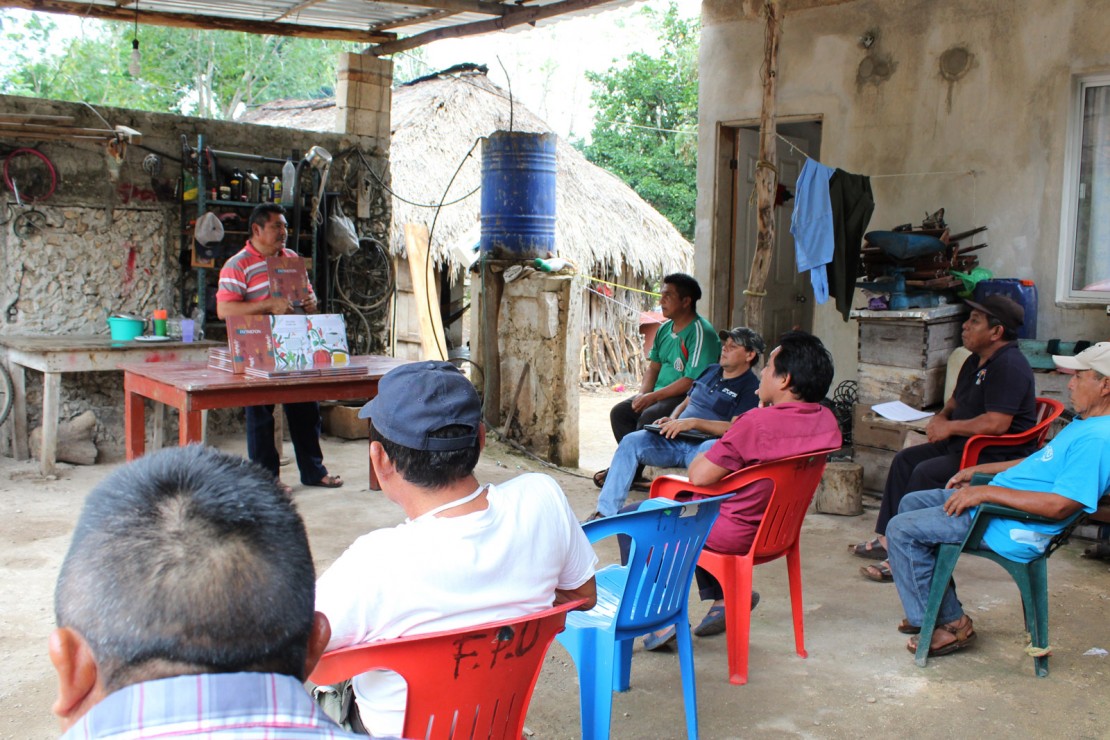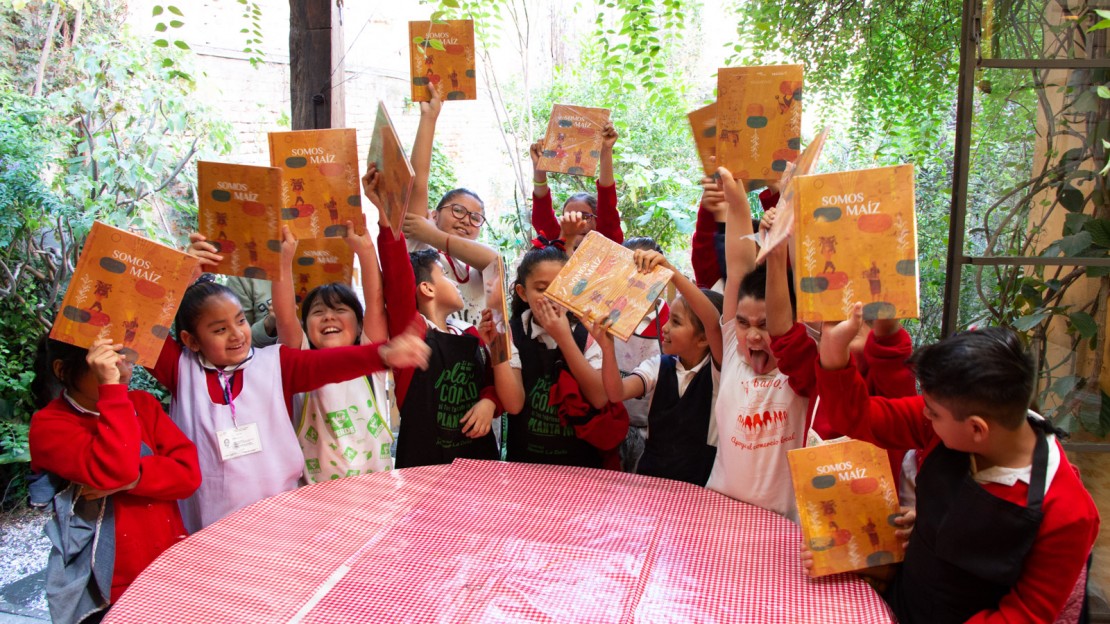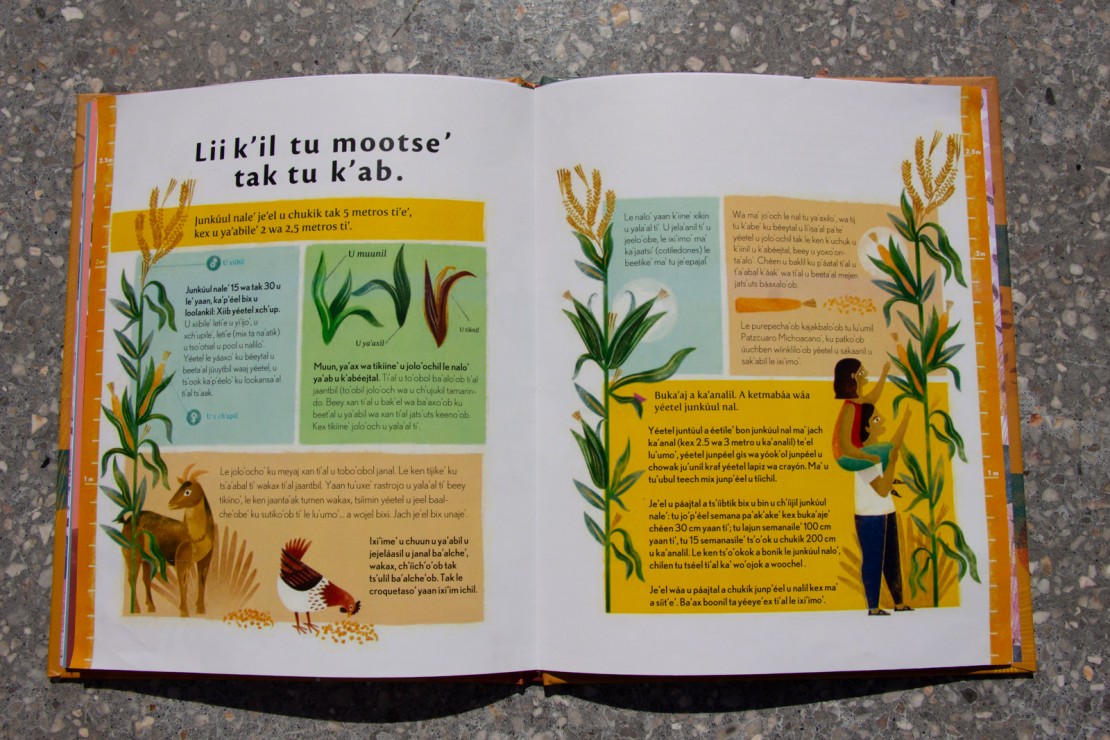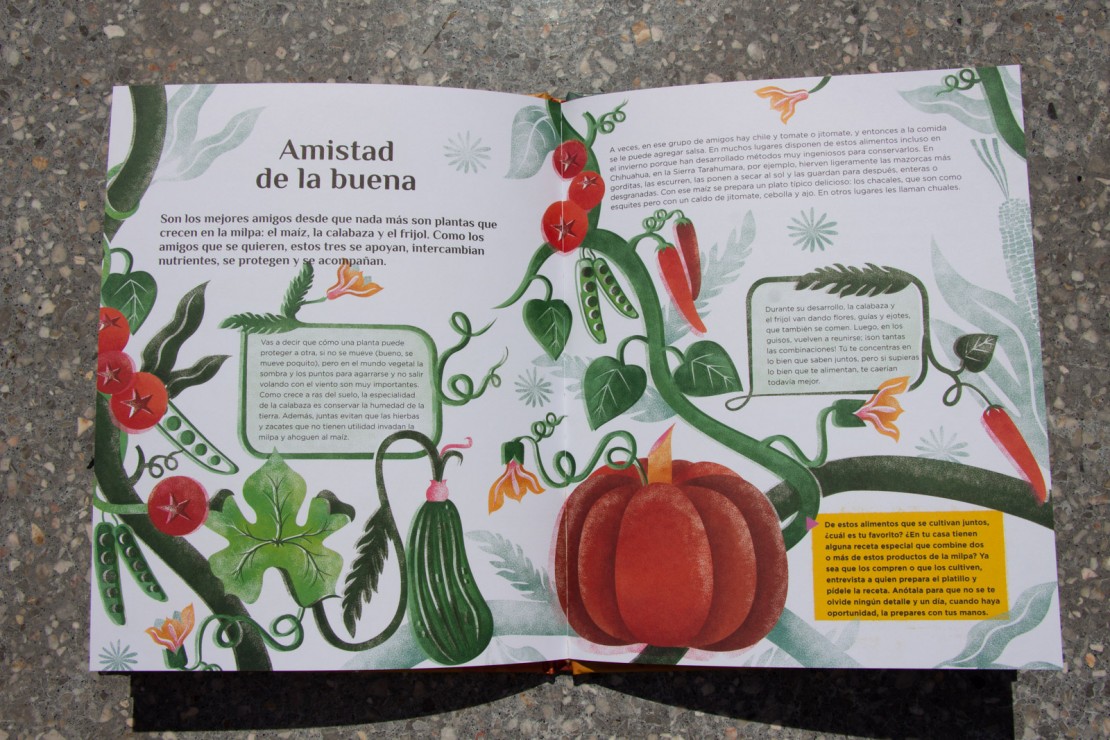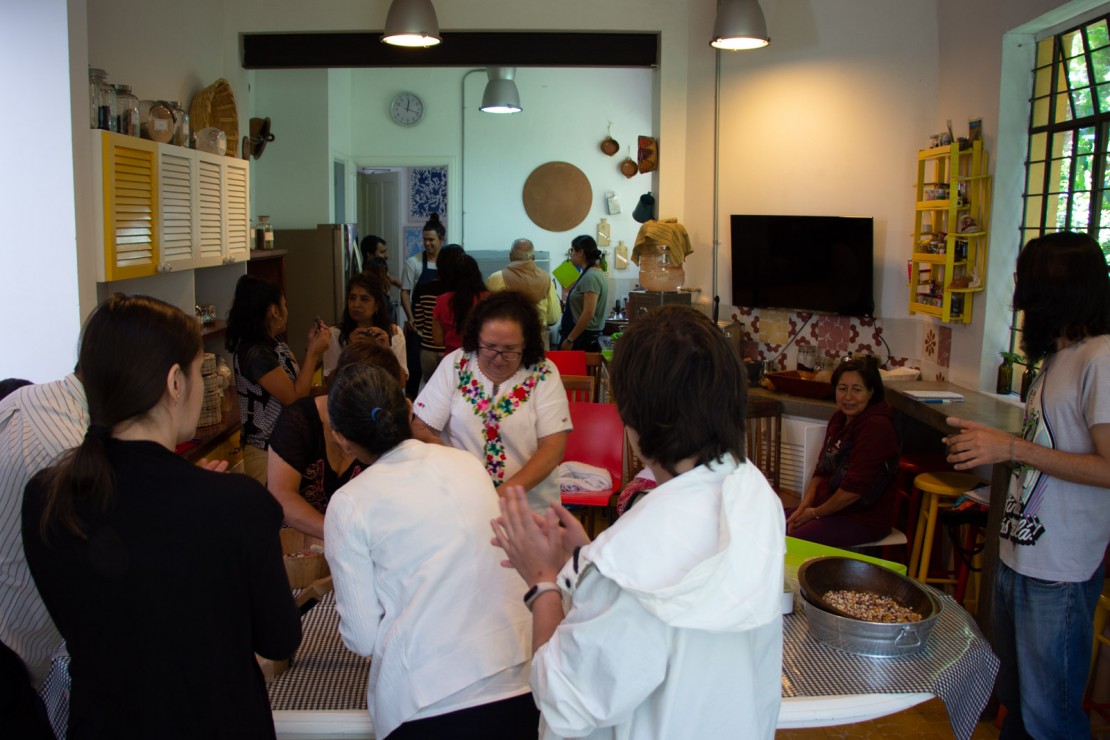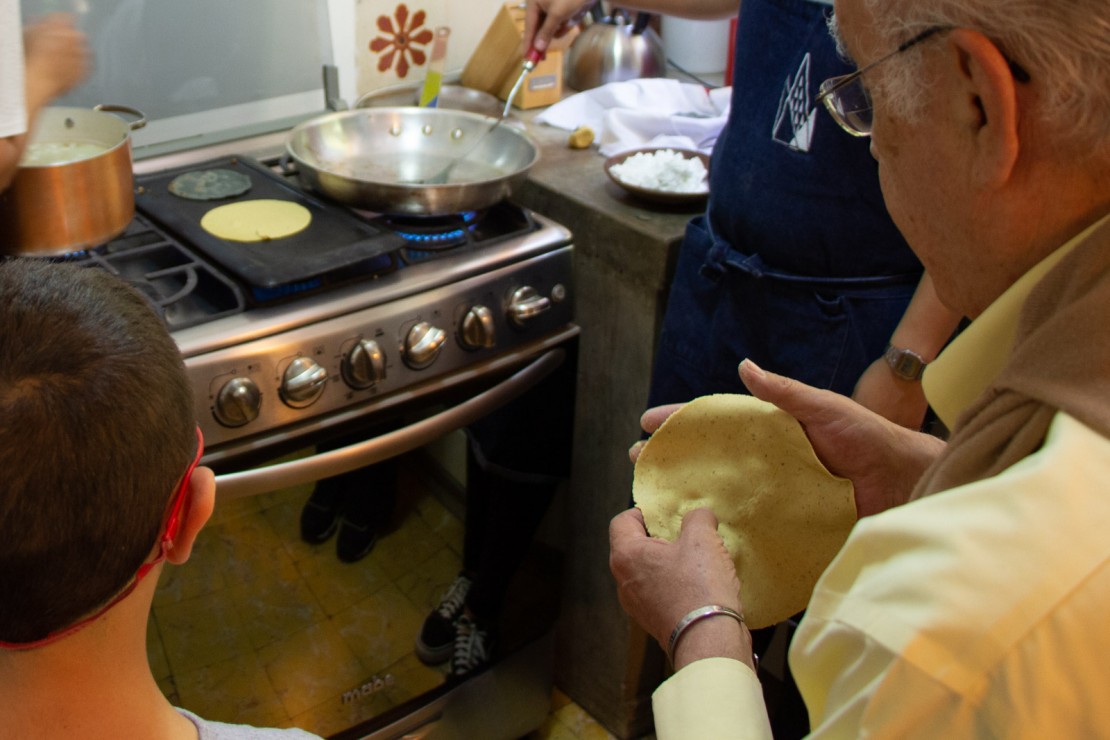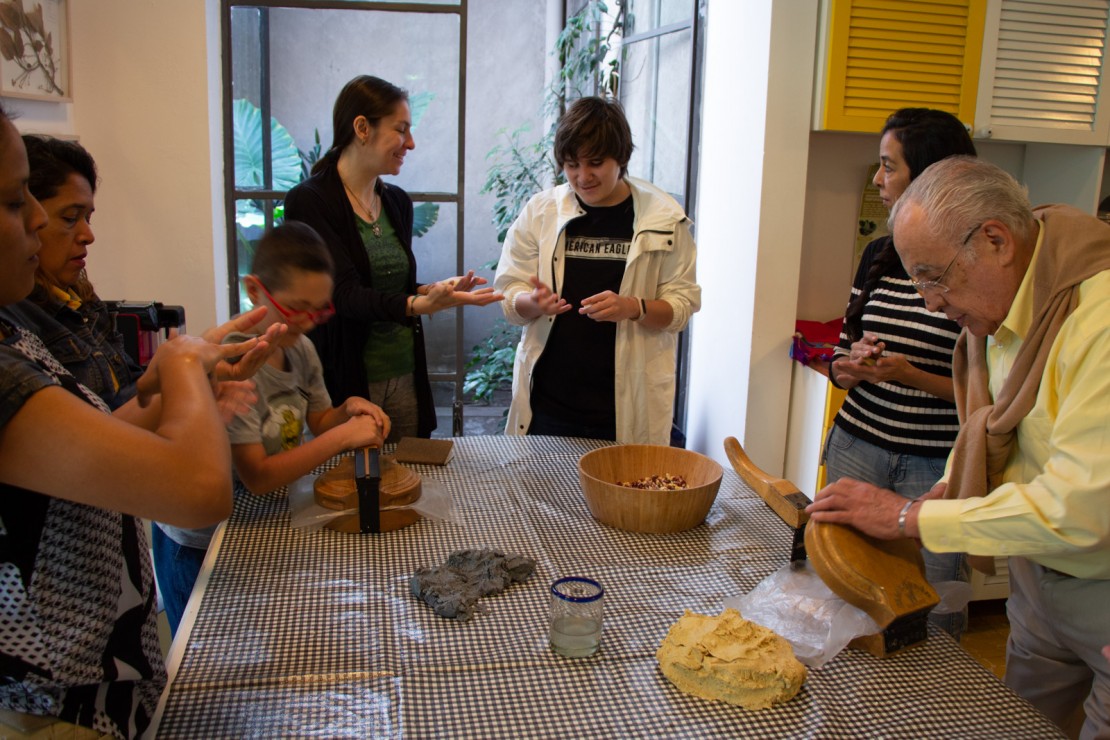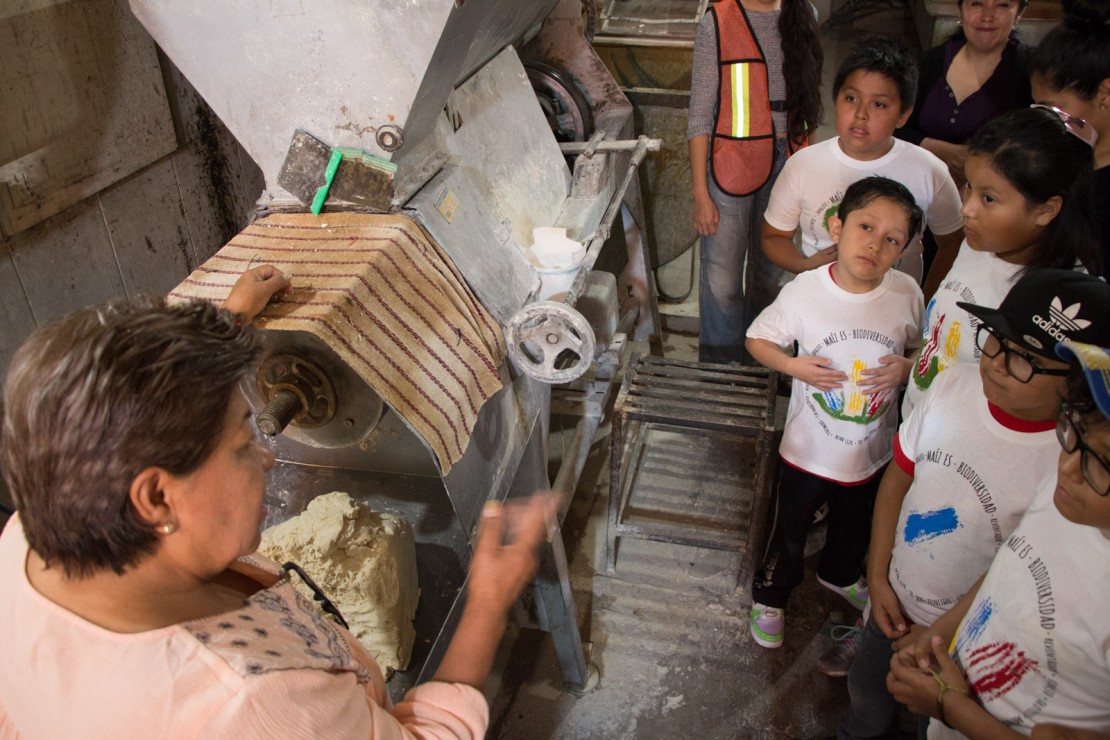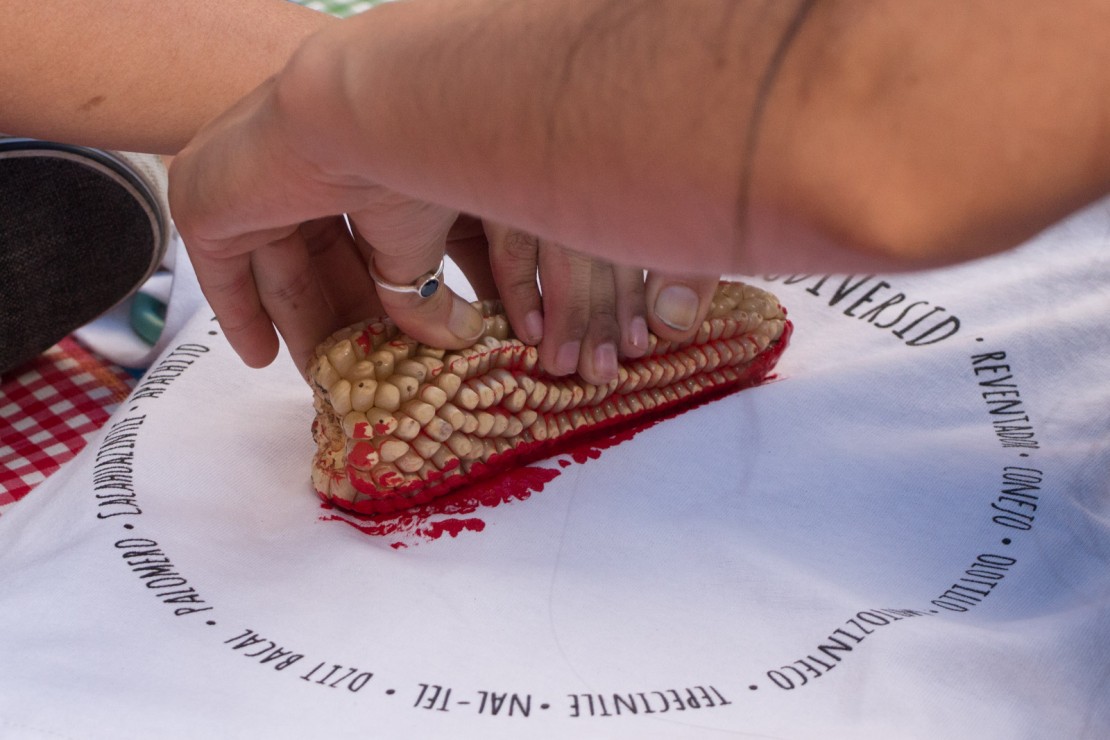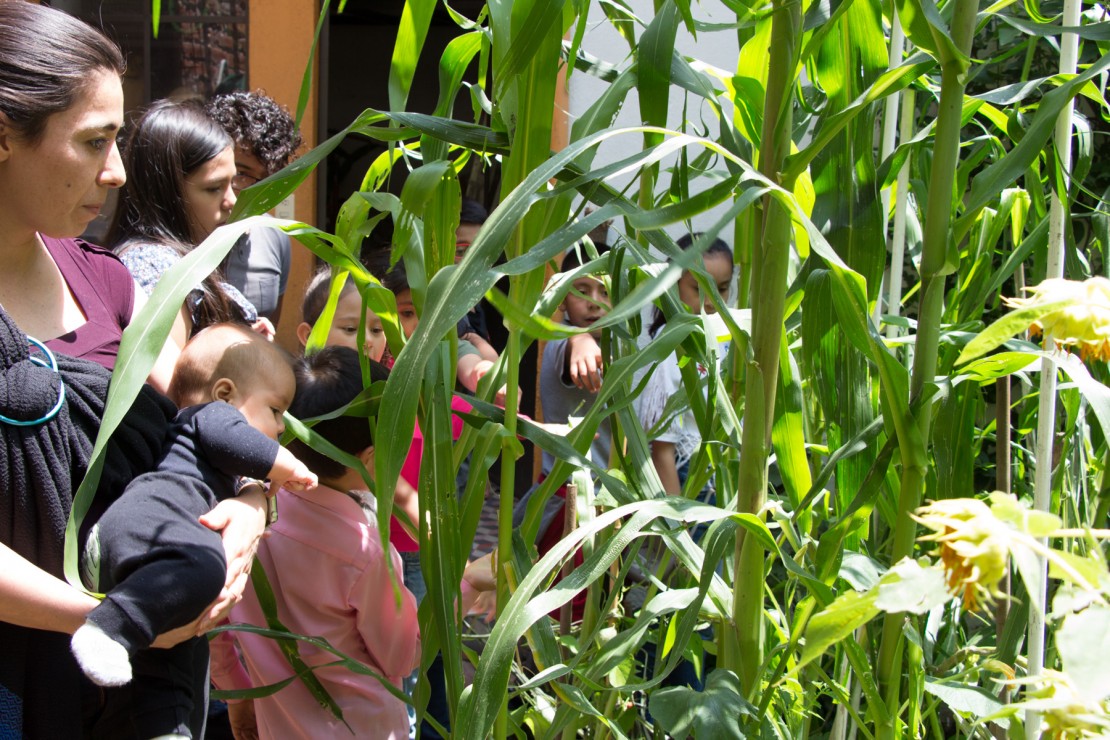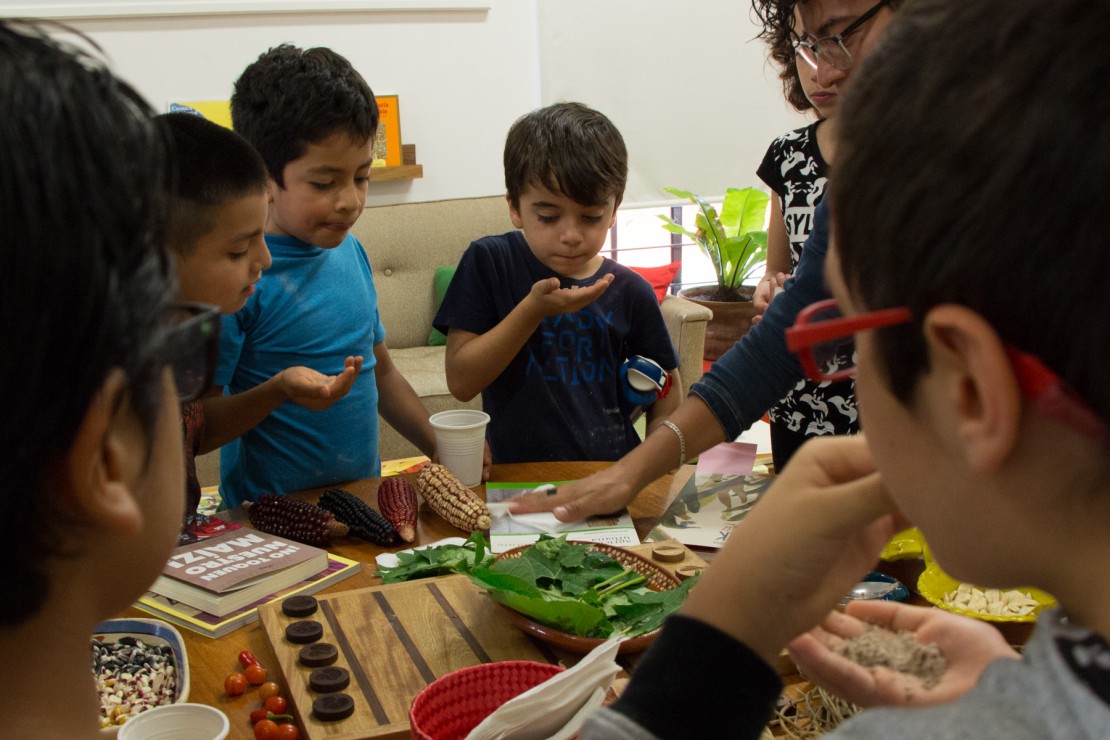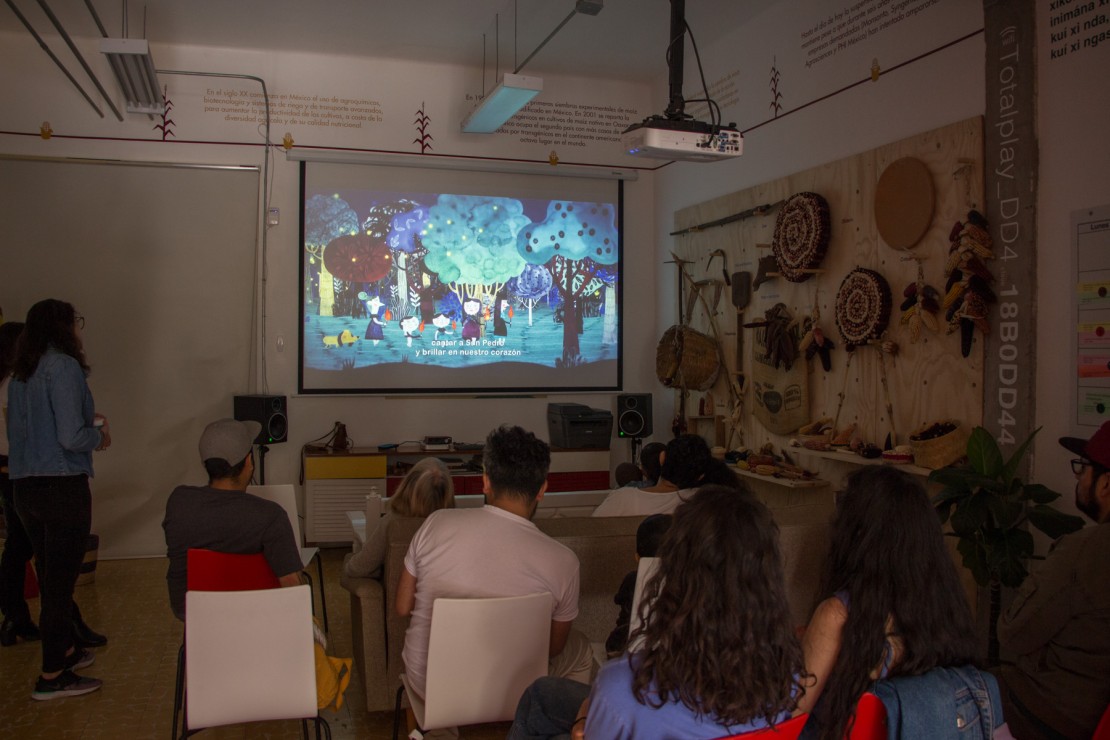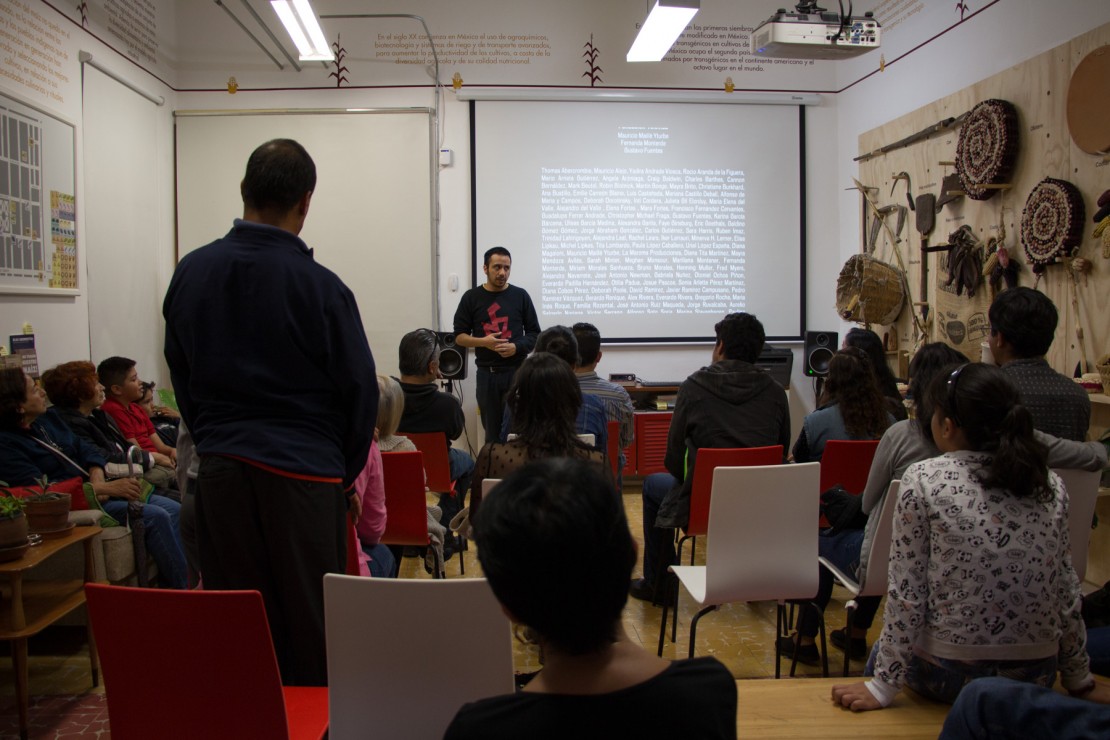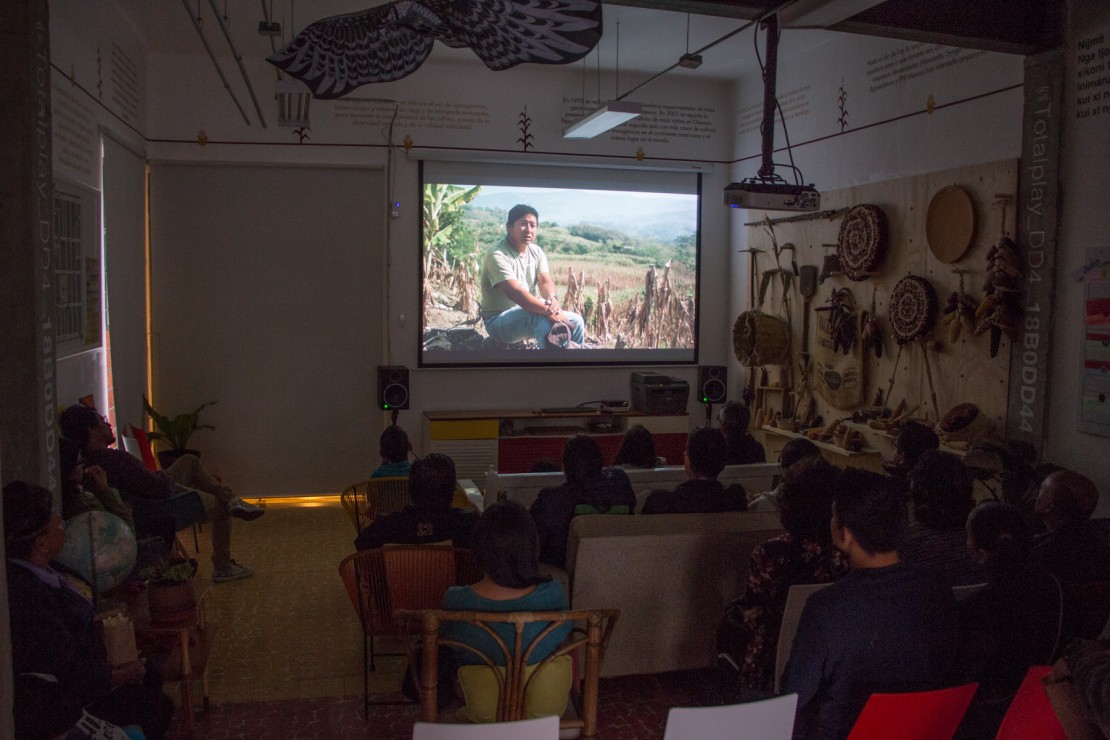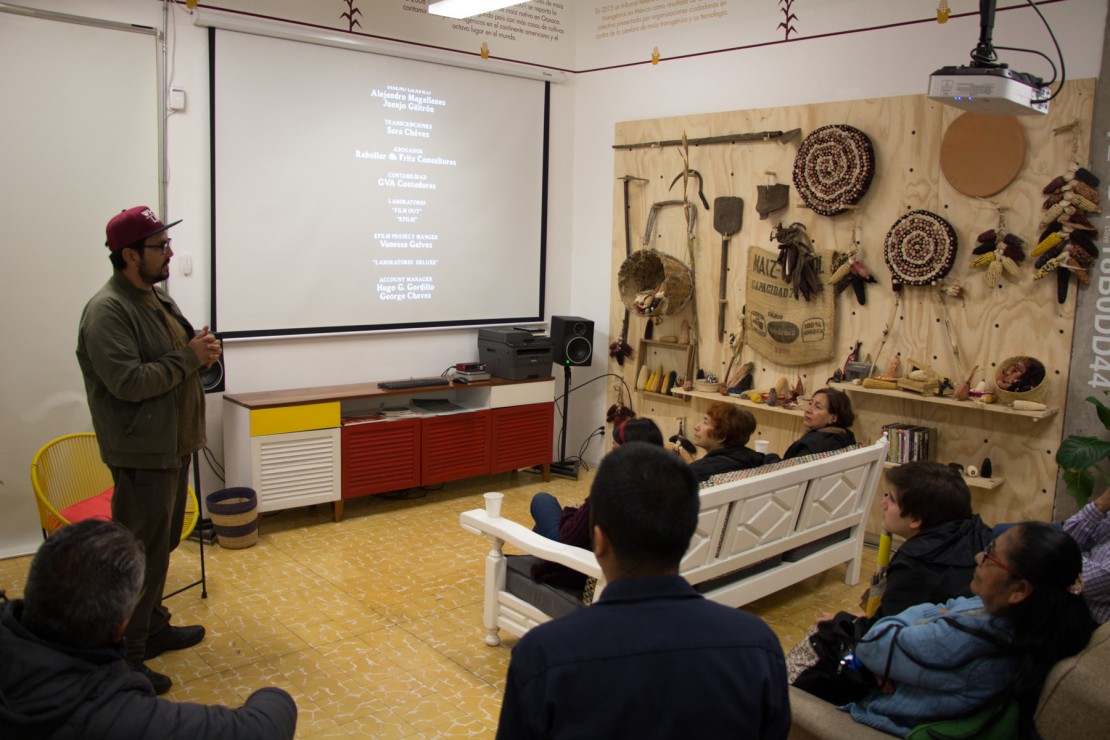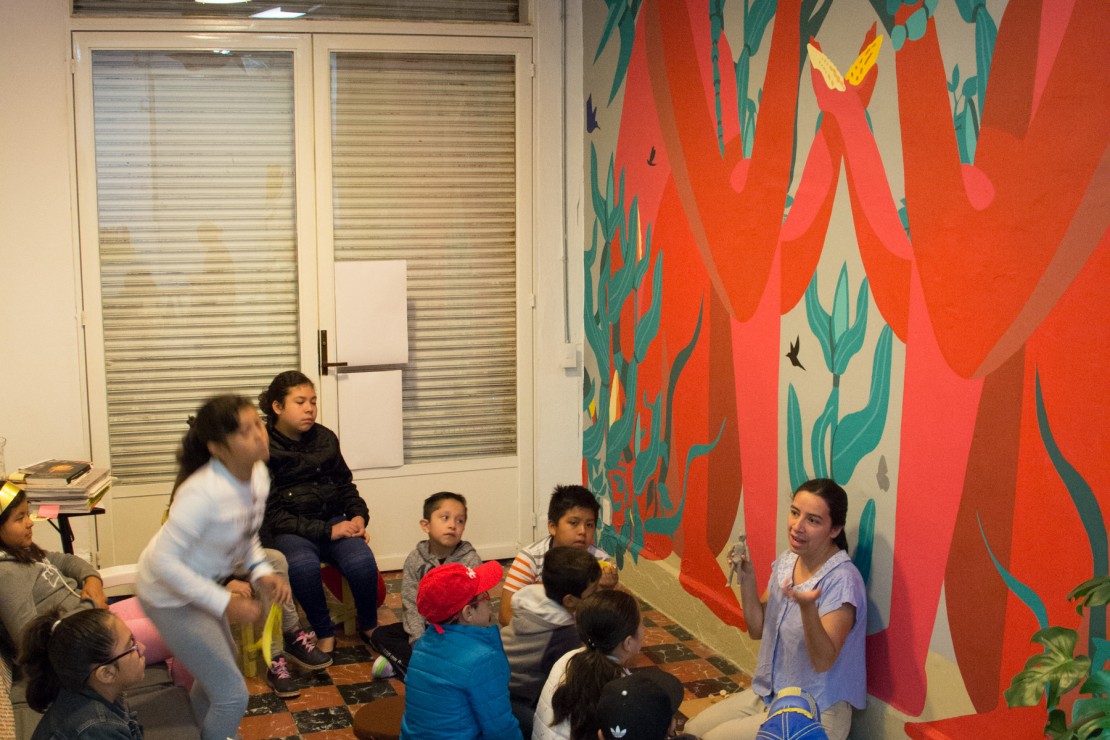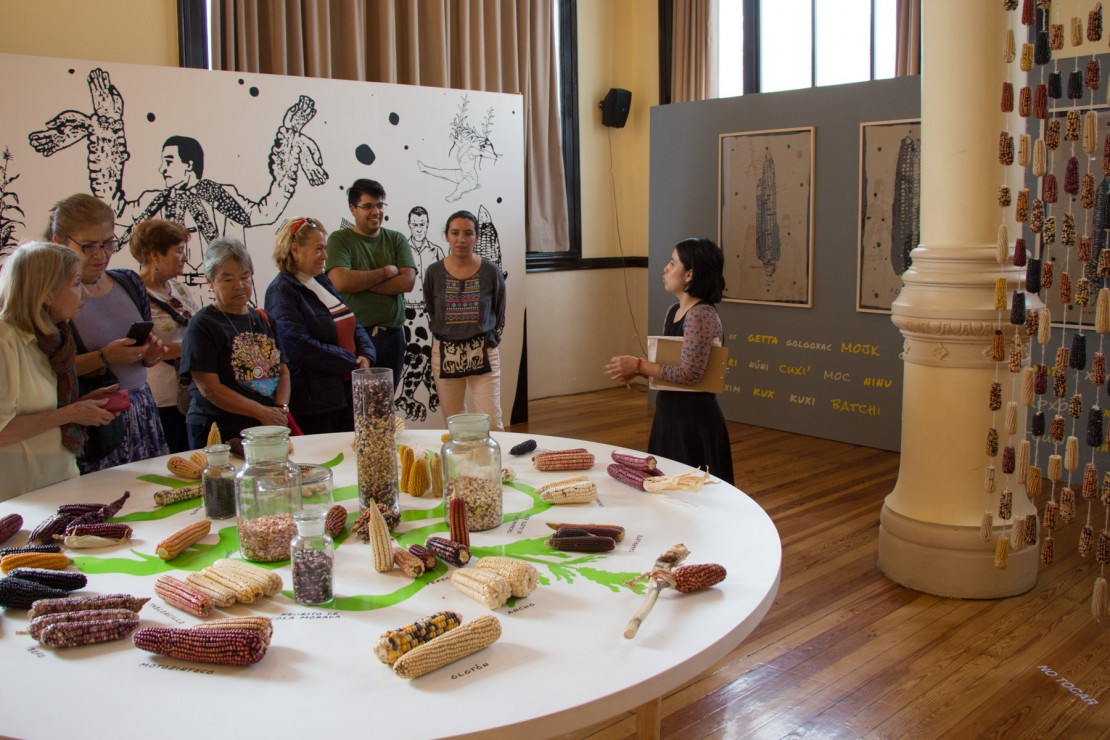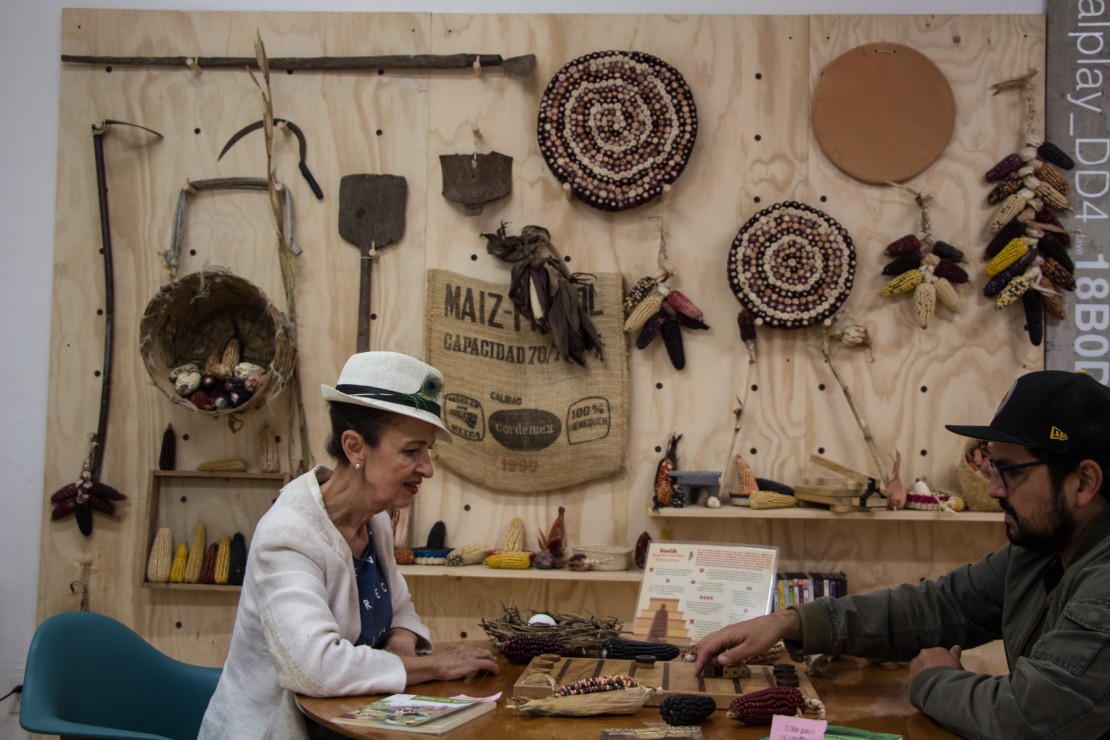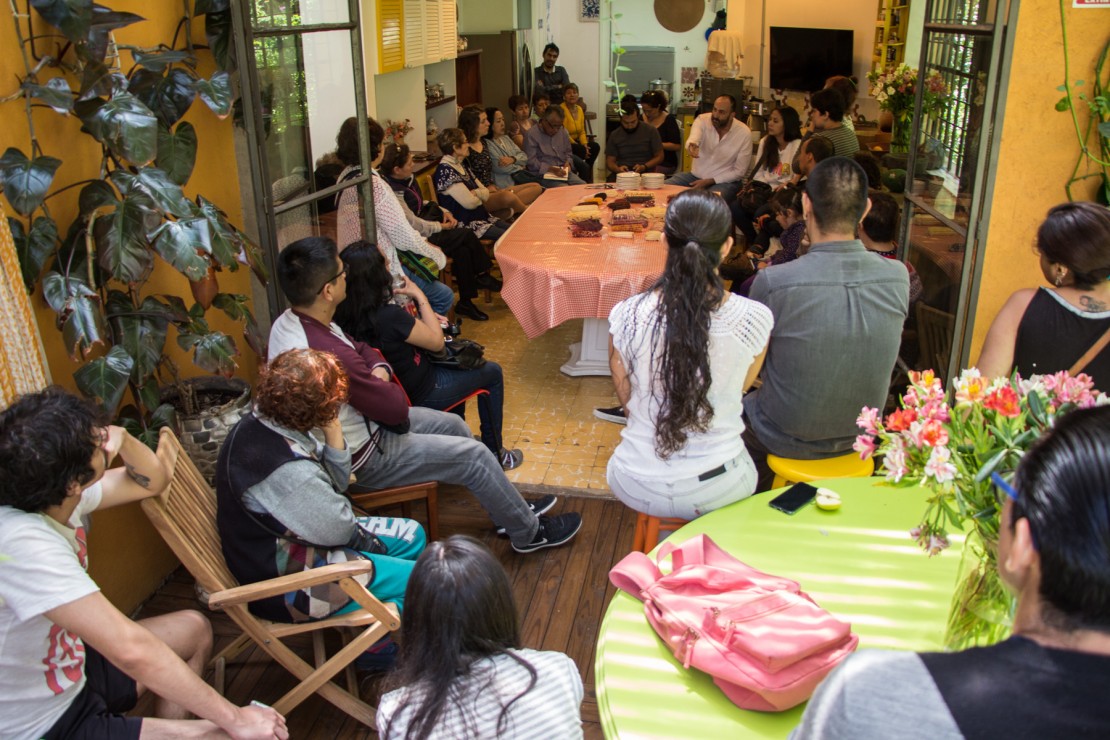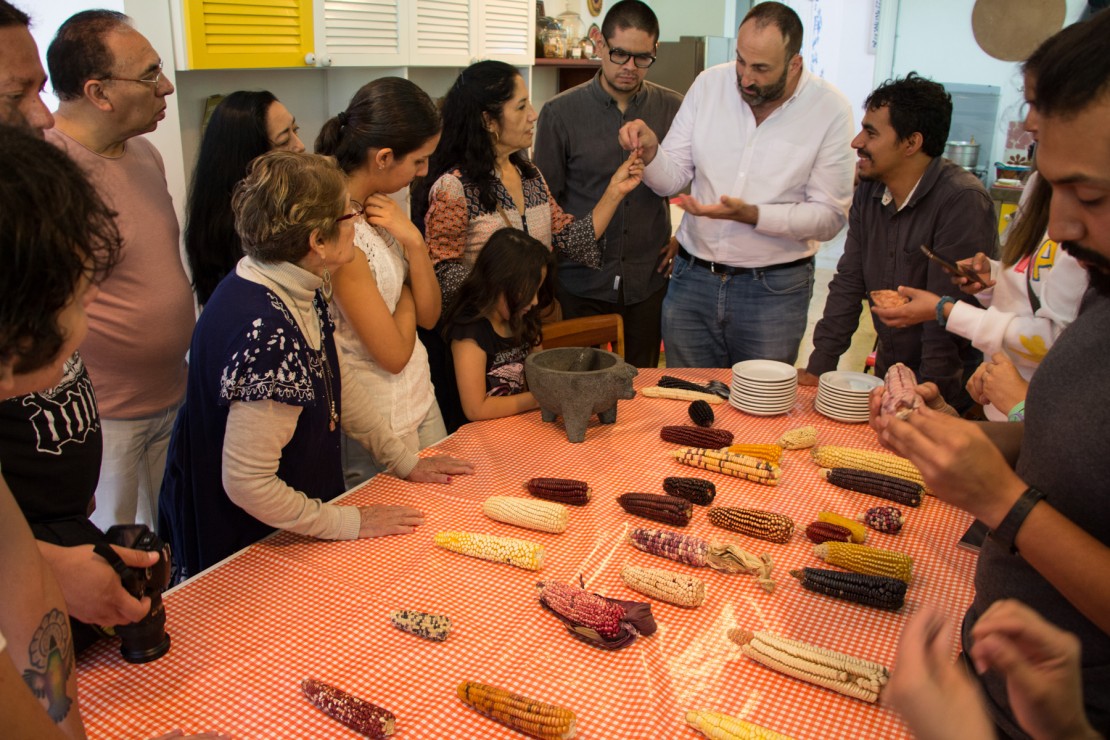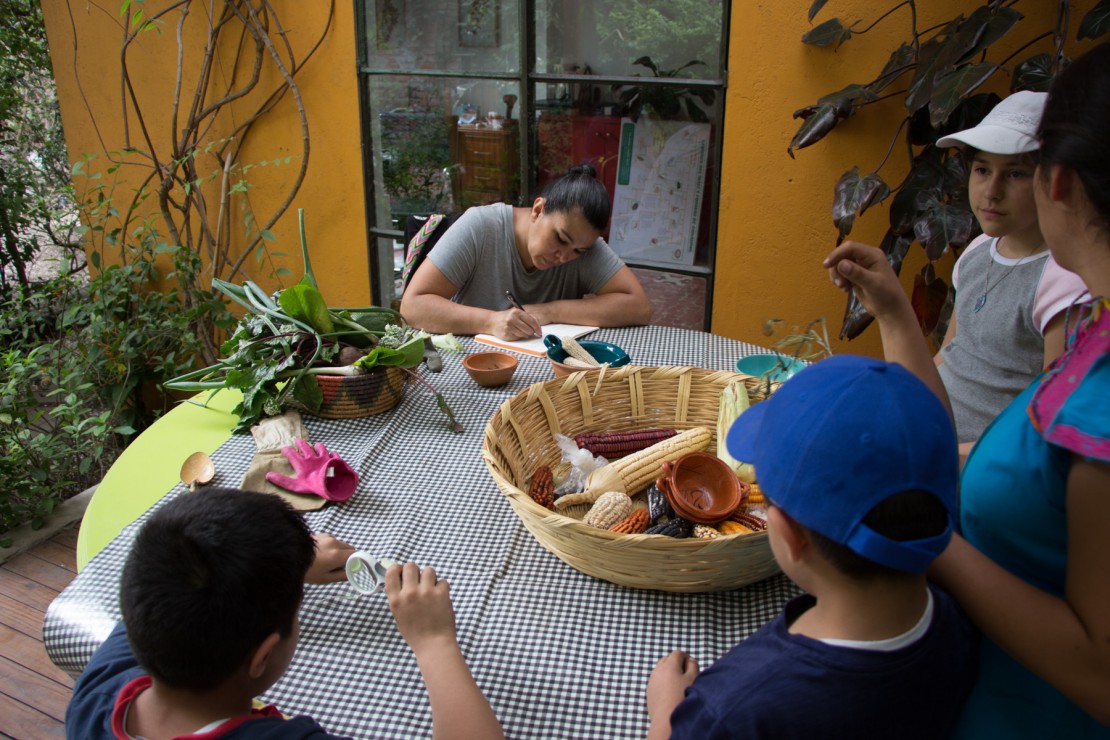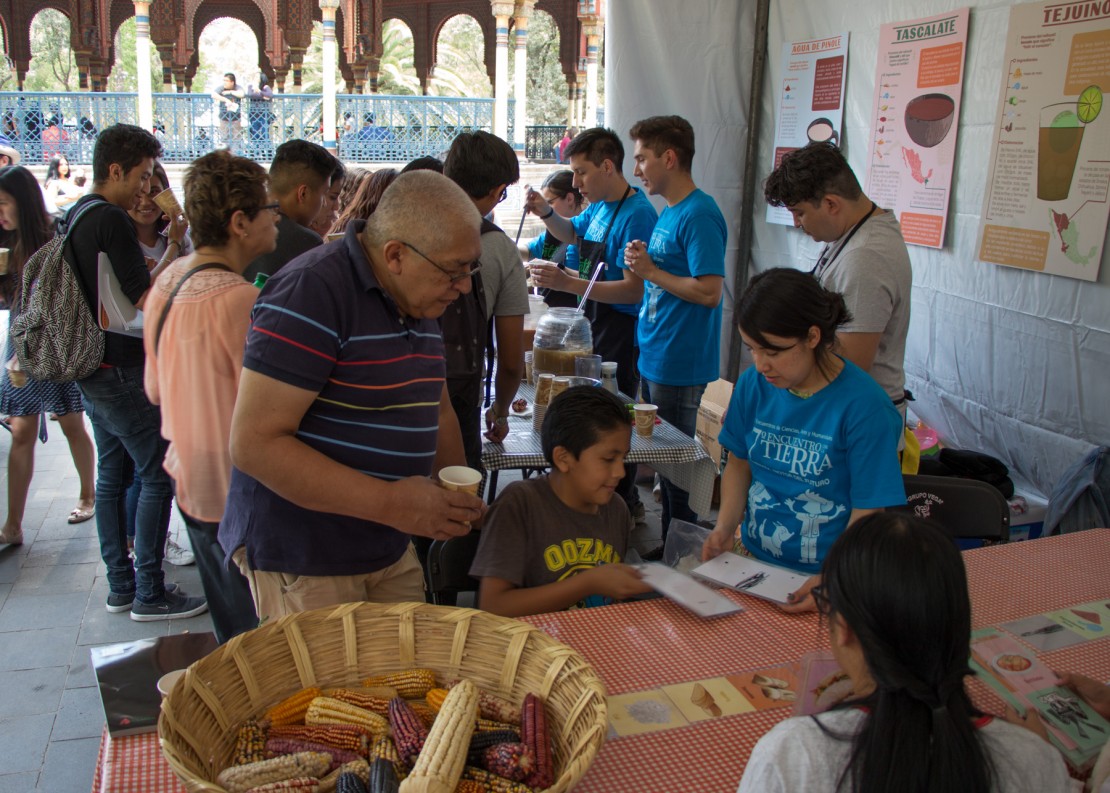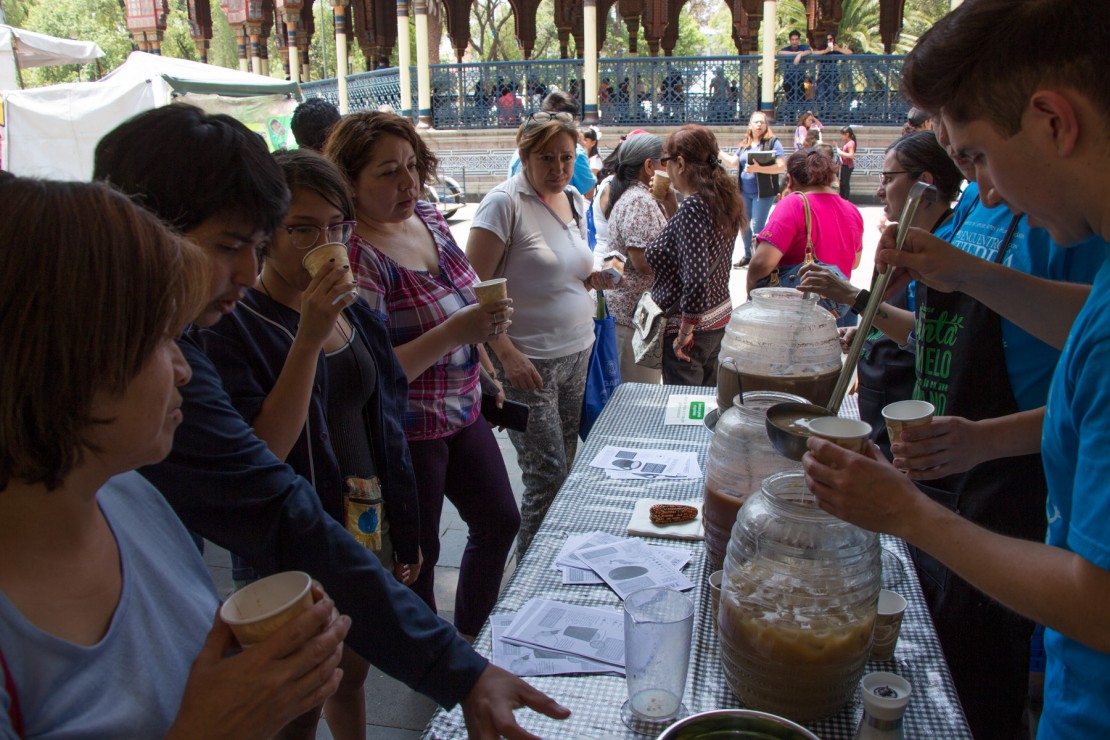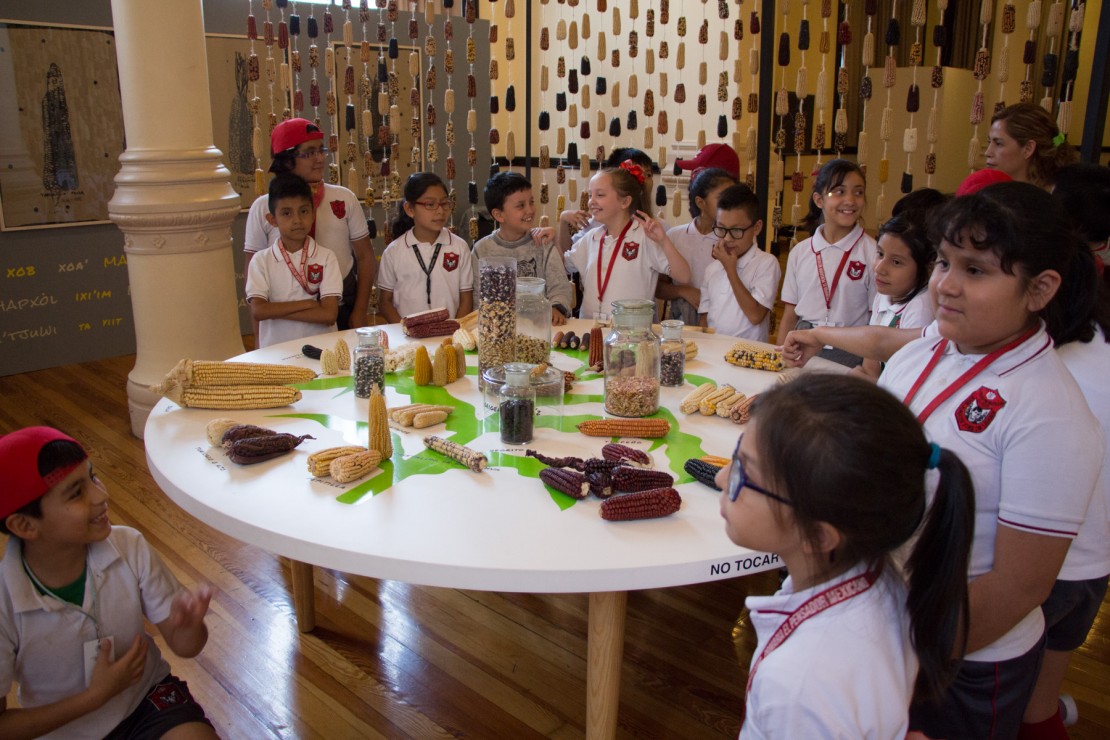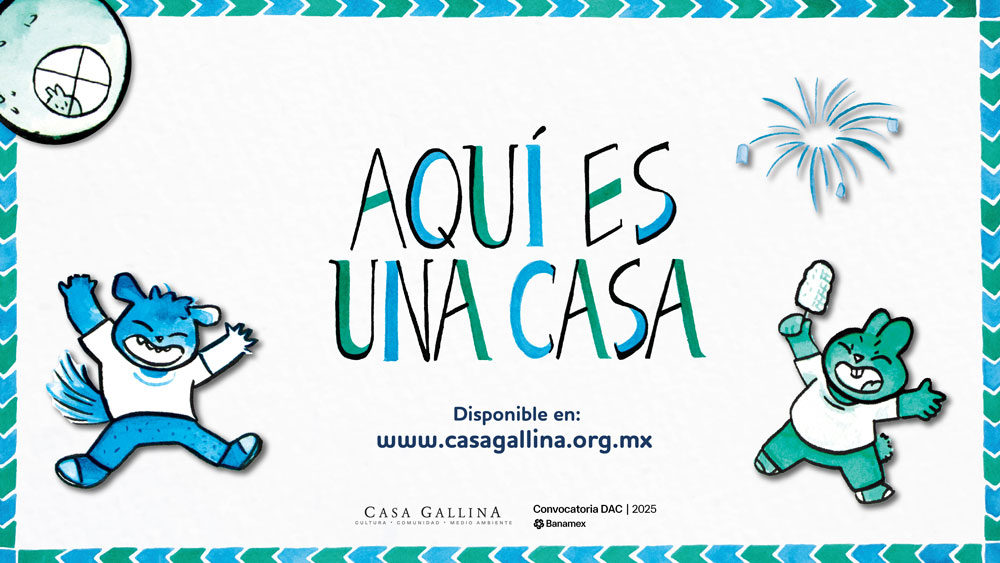Maize: Biodiversity and Culture in Everyday Consumption
The activities included a critical reflection on the importance of the biodiversity that exists in Mexico and its sixty-four different species of maize, most of which are native. It also included discussion of the implications of the implementation of genetically modified seeds, the nutritional impact of the consumption of industrialized maize flours derived from the recent elimination of nixtamalization processes, as well as cultural meanings associated with the food’s consumption, and the nutritional values of a diet based on maize and other crops from the milpa.
The strategy included alliances with different specialists in the issue, such as Rafael Mier, an activist focused on defending native maizes and quality tortillas throughout the Mexican territory, as well as Valeria Ramírez, a specialist in children’s environmental education and the creation of urban gardens; Carlota Pacheco, a chef from Xochimilco; Calpuli Tecalco, a civil society association focused on restoring the cultivation of terrace milpas, along with several other professionals who shared their knowledge about maize and related topics with neighborhood residents.
This platform, focused on critical reflection related to maize and its consumption, made it possible to build an informed consciousness among neighborhood residents of Santa María la Ribera – as well as in other territories where the contents generated by Casa Gallina circulate. This, in turn, has enabled peopled to make decisions about responsible consumption and encouraged more direct citizen involvement in issues of nutrition, diversity, conservation of the environment, and better development policies in tune with nature and health.
Workshop on Food From the Maizefield
Date - April 26, 2025
Facilitated by - Angelica Palma and Rosalba Rodriguez
Allies - Calpulli Tecalco A.C.
Participants - 17 inhabitants of Santa Maria la Ribera
The cooks and promoters of this workshop visited us from Milpa Alta to prepare food from their territory. The menu they prepared went from quelites (wild greens) with nopal cactus and cheese in a pipian (ground nuts) sauce, a capirotada bread pudding for desert and a refreshing pinole (toasted corn flour) drink. The cooks explained the process to prepare the water-based pipian sauce and related customs in the community of San Pedro Atocpan, which opened a discussion on different ways of cooking according to traditions and family surroundings.
Food From the Maizefield: in Collaboration With Calpulli Tecalco
Date: 21 September, 2024
Workshop Leader: Angélica Palma and Rosabal Rodríguez
Participants: 6 inhabitants of Santa Maria la Ribera
This program is divided into several workshops, to link the species that grow within the maize planting system and relate them to a cooking recipe from the Milpa Alta territory. The participants were guided by Angélica Palma and Rosalba Rodríguez, from Calpulli Tecalco, in the preparation of anis tamales and beans with quintonil (a green herb), in addition to sharing information and traditions that involve using these ingredients.
Flavors and Knowledge of the Maizefield: Encounter of Guardians of Seeds
Date: June 3, 2023
Hosts: Rosalba Rodríguez and Angélica Palma
Allies: Calpulli Tecalco A.C., Cooperativa Agropecuaria Tetzico, Grupo de Estudios Ambientales (GEA), Fundación Semillas de Vida, ENLACE: Comunicación y Capacitación, Huerta Gosén, Cocina Colaboratorio, ETC Group and Red en defensa del maíz.
Participants: 12 promoters of maize and endemic seeds
This encounter gathered promoters and guardians of endemic maize seeds for a lunch that aimed to establish personal links that strengthen the working networks fostered by the guests. In the framework of the publication Flavors and Knowledge of the Maizefield, jointly published by Casa Gallina and Calpulli Tecalco, the guests talked about their trajectory and the efforts they have invested to to reinforce the conservation and care of maize and the biodiversity found in the maize field, an agro-food system whose bounties preserve the food security of communities and peoples.
Flavors and Knowledge of the Maizefield: Cycle of Workshops
Dates: 1 and 7 March, 27 and 29 April, 2023
Facilitated by: Angelica Palma, Rosalba Rodriguez and Silvia Naomi Olivos
Ally: Calpulli Tecalco
Participants: 60 inhabitants of Santa Maria la Ribera.
Format: in-person
As part of the joint activation of the publication Flavors and Knowledge of the Maizefield with the association Calpulli Tecalco, we offered a program of workshops aimed at exploring the ingredients, dishes and festivities associated with eating the field’s produce through its link to the territory of San Pedro Actopan, Milpa Alta. The cooks Angelica Palma, Rosalba Rodriguez and Naomi Olivos presented the following workshops : The Maize Field we Inhabit at Home; Workshop on Corn Tamales and White Atole; Bridal Breakfast and By Youth For Youth Cooking Workshop. During these sessions the participants learned regional recipes linked to festivals, as well as practical ways to use the ingredients to prepare nutritious foods and drinks that can be included in the neighborhood family menus.
Communal Shop: the Month of Maize
Date: September 24 - October 8 2022
Ally: Calpulli Tecalco A.C.
Producers: the Palma Rodríguez family
Facilitated by: Angélica Palma, Rosalba Rodríguez and Essau Palma
Participants: 34 adults and 12 children, inhabitants of Santa María la Ribera, in workshops
During the month of September we hosted the N.G.O. Calpulli Tecalco, which brought a variety of produce for sale in the Communal Shop: greens, herbs, maize, and seeds cultivated in their family plots. At the same time they held a work program with neighbors of Santa María la Ribera, with the aim to delve into the nutritional culture of the maize field: Flavors and Knowledge of the Maize Field: Workshop on the Preparation of Chileatole (a drink), Workshop on the Preparation of Mushroom Pozole Soup and Workshop on the Production of Toys Made from Stalks and maize field residues.
Accompaniment Program for Activating Materials on Maize
Dates: January–June, 2021
Facilitator: Cecilia Pompa
Allies: Uyoolche A.C., Calpulli Tecalco, Diixazá Xtinu, Alianza Milpa, APISA, Ka´Yok´ Cancun Planetarium
As a support program to strengthen alliances initiated in Encounters around Maize, individual consultancies have been developed for organizations that wish to use and activate the book We are corn, the exhibition Maize, Cornfield and Biodiversity in Mexico and the educational program Vacations in the Cornfield. For this purpose, educator Cecilia Pompa has met with members of the Uyoolche A.C., Calpulli Tecalco, Diixazá Xtinu, Alianza Milpa, APISA and the Ka´Yok´ Planetarium of Cancun to support them in tailoring the materials for each partner organization.
Maize, Cornfield and Biodiversity in Mexico, a Community Exhibition
Dates: From March 18 to June, 2021
Partner organization: Ka´ Yok´ Cancún Planetarium
The community exhibition Maize, Cornfield and Biodiversity in Mexico was mounted at the Ka´Yok´ Planetarium in Cancun, where it remains open to visits. The exhibition was activated alongside a public program designed by the planetarium’s educational department. This exhibition is the result of the work started in the Encounters around Maize seminar series carried out by Casa Gallina in November 2020.
Exhibition: Maizes, Biodiversity and Culture. An Approach Based on Everyday Consumption
Dates: April – August, 2019
Location: Geology Museum
Research: Rafael Mier
Artist: Demián Flores
Educational Program: Cecilia Pompa
Attendees: Students and teachers from neighborhood basic, secondary, and preparatory schools, as well as other groups of neighbors
The exhibition enables critical reflection about maize and its diversity as a fundamental element of Mexican culture and diet. The exhibition includes research by Rafael Mier, a specialist and activist who has worked to defend native maizes and quality tortillas throughout the Mexican territory, as well as an aesthetic proposal by the artist Demián Flores, who approaches the issue through graphics, mixing a contemporary urban perspective with pre-hispanic cosmogony.
The exhibition in the Geology Museum allowed school groups and neighborhood residents in general the opportunity to engage in didactic activities related to the issue. The didactic experiences made it possible to deepen the relationship with local schools and residents, as well as to construct a critical approach to issues related to the environment and everyday life.
7th Encounter with the Earth
Date: April 7th, 2019
Location: Public park of Santa María la Ribera
Participants: 500 neighbors
The Encounter with the Earth is an annual event organized by the Geology Museum of the UNAM and the Cuauhtémoc townhall, which invites different university institutes, collectives, and institutions working on scientific education and the implementation of proposals for environmental regeneration. For the third year in a row, Casa Gallina was invited to participate with a stand called “Maize: Knowledge of the Earth.” The stand offered a space to disseminate information about the native species of maize in Mesoamerica, their evolution from the common ancestor teocintle, their varieties, and their contemporary uses in rural and urban communities.
Several rounds of a domino-style board game were played, in which participants linked images of maize consumption to ideas and concepts related to diversity. In another space in the stand, neighborhood residents contributed to a collaborative map in which they located their trusted tortillerías and other spaces where maize products are cooked in a traditional way. The space also offered traditional beverages made from maize: agua de pinole, tejuino, and tascalate. Participants were able to learn more about how each of those drinks is made and could take the recipes to reproduce them at home. Through these playful strategies, the activity created a bond between participating neighbors and maize, understood as a fundamental element of everyday culture and as a primary source of nutrition.
Milpa Workshop for Children
Dates: April – May, 2019
Facilitator: Valeria Ramírez
Participants: 15 residents of Santa María la Ribera
Over the course of five sessions, children, accompanied by their families, carried out the necessary actions to start a traditional milpa as part of Casa Gallina’s vegetable garden. In this way, they learned how the interaction between a large number of species turns the milpa into an ecosystem, in which the system’s different resources (water, light, soil) are used in a complementary way, providing different benefits not only to the species that co-exist in it, but also to the human communities that manage them.
This workshop allowed families to have direct contact with the traditional form of milpa cultivation and to learn about the processes of symbiosis and exchange that are present in this form of Mexican agriculture.
Conversation: The Diversity of Mexican Maizes
Date: June 8th, 2018
Coordinator: Rafael Mier
Participants: 30 residents of Santa María la Ribera
Activist Rafael Mier led a discussion with neighborhood residents about the importance of demanding high-quality nixtamalized tortillas made with good maize and encouraged the attendees to participate in collective initiatives in defense of food sovereignty in everyday life. To do so, he coordinated a tasting of tortillas made with different types of maize flours and dough, in order to distinguish between the different qualities.
This activity provided participants with the tools to identify different types of maize and how they are prepared, so that they can then apply them to identify what type of maize they are consuming in everyday products such as tortillas and tamales.
Salón Huev@: Milpa and Maize
Dates: June – September, 2019
The contents displayed in Salón Huev@ focused on critical reflections about maize and the milpa. They integrated information about the process of maize domestication, poems in native languages about that plant, the diverse types of milpa, the nutritional quality of maize and other products from the milpa (zucchini, beans, chilies, etc.). Additionally, the space also included a version of the Mayan board game Boolik and an intervention by neighborhood resident Mariana Aranda depicting a scene in the Popul Vuh.
The critical focus on maize made it possible to carry out several activities about the theme, geared towards different audiences, including the summer course, film projections, and talks, among others.
Cycle of Films on Agricultural Life
Timeframe: July-August, 2019
Coordinator: Roberto Campos
Associates: Alberto Cortés and Teresa Camou
Participants: 71 neighbors
Projection of documentaries offering different perspectives on social phenomena such as environmental deterioration, labor exploitation, as well as the discrimination faced by rural communities in their daily efforts to preserve agricultural practices associated with food sovereignty or environmental and cultural diversity in Mexico. The following films were presented in this cycle: Friends from Australia (“Cuates de Australia”, Everardo González, 2011), The Heirs ("Los Herederos", Eugenio Polgovsky, 2008) and The Absent Stone ("La piedra ausente" Sandra Rozental, Jesse Lerner, 2013), chosen by the neighbor Roberto Campos. In addition to Maize in Times of War ("El maíz en tiempos de guerra" , 2016) and "Sunú" (2015), whose directors, Alberto Cortés and Teresa Camou respectively, spoke with the audience.
Over the course of 2019, a group emerged, comprised of neighbors who frequently attend film projections. Hence, the discussions held after each session have acquired consistency and continuity. During this cycle, the group coalesced and focused their debates on the connection between urban needs and the rural challenges addressed in each film. The guest directors provided insight into the process of making their films and shared with neighbors their concern that city dwellers should define ways to contribute to the defense of food sovereignty and self-determination for indigenous peoples. During the final session, the neighbors shared their experiences in writing, which served as a reference to plan new strategies that could convert some of their conclusions and questions into specific actions.
Cornfield Neighborhood: Growing at Different Rhythms, Doing Different Things
Timeframe: July, 2019
Led By: José Camargo and Jessica Gutiérrez León
Participants: 34 girls and boys aged between 6 and 10
In this workshop, boys and girls from the neighborhood participated in educational exercises on the ecosystemic vision of maize cultivation, where various species coexist, such as maize, pumpkin, beans and chili peppers. They approached the cultural, nutritional and biological importance of polyculture through playful resources and by conducting experiments.
The workshop allowed the children to experiment with various notions of agroecology present in traditional cornfields, such as biodiversity, polyculture, ecosystem and indigenous cosmovision related to maize and cornfields. In becoming acquainted with the milpa system, the children made associations with social relationships of collaboration that occur in their neighborhood, including: interdependence, diversity, exchange of knowledge and interculturality.
Holidays in the Cornfield. Workshop for Children on Traditional Mexican Agriculture
Timeframe: July - August, 2019
Design: Valeria Ramírez
Led By: Valeria Ramírez, Moisés Ledesma and Julia Rocha.
Participants: 62 children aged between 6 and 12.
The horticulturalist Valeria Ramírez developed an educational program for a group of 15 children, to experience over an entire week the various aspects of cultivating, preparing and consuming maize and other species present in the milpa (traditional Mexican cornfield). This program was carried out over a 4 week period with 4 different groups of children, divided according to their age. A workbook was produced as support material for the suggested experiments, games and exercises, featuring texts by Roxanna Erdman and illustrations by the artist Demián Flores. This educational material accompanied the children in their activities, which included an outing to the neighborhood: during the first two weeks, groups 1 and 2 visited the exhibition Maize, Biodiversity and Culture in the Museum of Geology, while groups 3 and 4 subsequently visited a traditional tortilla manufacturer that produces and sells nixtamalized dough.
This course raised awareness among the children on topics such as original Mesoamerican myths surrounding maize, the evolution of different Mexican species, the risks of GMOs, as well as the importance of traditional cultivation systems and the process of nixtamalization. At the end of the week, the children shared their knowledge with their families and neighbors: there was a discernible change of attitude regarding the value given to different Mexican maizes and the cornfield as a system of agriculture and biodiversity.
Projection: 68 Voices
Timeframe: 17th August, 2019
Led by: Gabriela Badillo and Enrique Sañudo
Participants: 28 neighbors
Associate: Hola Combo
Projection of an animated series of indigenous Mexican stories narrated in their original language—the 68 “voices”—produced by the Hola Combo animation studios. On the day they were projected, members of the collective spoke with those present about the importance of promoting respect for indigenous communities among girls and boys, as well as recognition for the social and ecological value of many of their original cultural practices.
Relevance – Due to this first encounter, new collaborations between Hola Combo and Casa Gallina are envisaged, geared at using animation as an educational resource to transmit and revalue indigenous knowledge in schools in Santa Maria la Ribera neighborhood.
Exhibition: Maizes, Biodiversity and Culture. An Approach Based on Everyday Consumption.
Dates: October, 2019 – March, 2020
Location: Cabañas Museum
Research: Rafael Mier
Artist: Demián Flores
The Maize: Biodiversity and Culture in Everyday Consumption exhibition traveled to the Cabañas Museum in Guadalajara, allowing a reflection of this grain in a different context: the city of Guadalajara being the capital of the state of Jalisco, the second-largest producer of maize in Mexico. The show included various educational activations organized by the Cabañas Museum’s educational team.
Book: We are maize
Dates: October 2019 – February 2020
Texts: Roxanna Erdman
Illustration: Adriana Campos
1000 copies in Spanish
500 copies in Maya
500 copies in Zapoteco
500 copies in Náhuatl
Associates: Asamblea Defensores del Territorio Maya Múuch’ Xíinbal
(Yucatán), Calpulli Tecalco A.C. (Milpa Alta), Kolijke Area Natural Protegida
(Sierra Norte de Puebla), Escuela Primaria Plan de San Luis de Tetelcingo
(Morelos), Cooperativa Tosepan (Sierra Nororiental de Puebla), Biblioteca
comunitaria de Juchitán (Oaxaca), Cine Too en Guelatao (Oaxaca),
among others.
We Are Maize is a book directed at younger readers, as much to the neighbors of Santa María la Ribera in Mexico City as to those belonging to Mayan, Zapotec and Nahua communities, towards celebrating, commemorating and nurture the consumption of maize. This grain has been a fundamental component in both the food and culture of our country, where sixty-four different species of it are grown, the majority of them being native to Mexico. This richness in biodiversity is closely related to a grand cultural complexity that has consolidated an essential part of local identities across the various regions where cosmogonies, rituals and culinary patrimony are associated with the consumption of this grain.
We Are Maize was published in four languages: the Spanish version was distributed among the neighbors of Santa María la Ribera, both individually and through community meeting places such as libraries, public schools and coffee shops, among others. The Náhuatl, Mayan and Zapotec versions were distributed through initiatives associated to Casa Gallina in territories inhabited by speakers of these languages.
Practical Nixtamalization Workshop
Date: August 31th, 2019
Facilitator: Santiago Muñoz
Participants: 18 neighbors
Partner: Maizajo
This activity was open to everyone who had an interest in learning about the process of nixtamalización: its origins, its cultural foundations and the nutritional value that this system provides to the preparation of maize. The activity had a conversational component where the domestication of maize; the danger of extinction of endemic varieties; and food security in terms of a product consumed daily as a vital part of the family diet were discussed. The participants engaged in the practice of dekerneling maize over a thresher and activating limestone in order to properly understand the cooking process.
We Are Maize: Book presentation in the Zapotec version at the José F. Gómez library
Date: February 21, 2020
Location: Juchitán de Zaragoza, Oaxaca
Ally: Vicente Marcial, Diidxazá Xtinu Program at the José F. Gómez Municipal Library.
Participants: Teachers and libraries from Zapotec communities in Juchitán
Within the framework of the International Day of the Mother Tongue, on February 21 2020, twenty copies of We are Maize translated into the Zapotec language were handed out. This publication was distributed with bilingual school teachers and public libraries in the region. The event was organized by Vicente Marcial, translator of the book into the Zapotec version, who is an advocate of the defense of said language through his work as professor and researcher and in his past role as deputy director of the National Institute of Indigenous Languages. The book was presented with the support of the Juchitán de Zaragoza local cultural authorities.
We Are Maize: Book presentation in its Náhuatl version in Calpulli Tecalco
Date: March 7, 2020
Location: San Pedro Atocpan, Milpa Alta, Mexico City
Ally: Calpulli Tecalco A.C. and Alberto Castro, Náhuatl translator
Participants: Inhabitants of San Pedro Atocpan, Mexico City
During the In chicahualiztli in tlahtlole (“The Force of the Word”) program, the book We are Maize in its version in the Nahuatl language was presented in Tlacuilcalco, at the headquarters of the Calpulli Tecalco A.C. located in San Pedro Atocpan, Milpa Alta. The event included the participation of Alberto Castro, teacher, promoter and defender of the Náhuatl language and the book’s translator, who spoke to the community about the importance of keeping the language alive and defending food customs that provide security and roots.
We Are Maize: Book presentation in its Mayan version at Xkalakdzonot
Date: December 23, 2019
Location: Xkalakdzonot, Yucatán
Ally: Assembly of Defenders of the Mayan Territory Múuch'Xíinbal, Pedro Uc Be
Participants: Inhabitants of Xkalakdzonot in Yucatán
The book We Are Maize, in its Mayan version Ixi'imo'on, was presented and distributed in the Xkalakdzonot community, Yucatán, in collaboration with the Mayan community organization Múuch Xíinbal and Pedro Uc Be, writer, manager, spokesperson for the organization and translator of this publication, who spoke to the community about the importance of maintaining and conserving nature’s gifts and assets, which he and his organization defend.
We Are Maize: Workshop of the Mayan Version in Xooy, Yucatán
Date: February 28, 2020
Location: Xooy, Yucatán
Ally: Assembly of Defenders of the Múuch'Xíinbal Maya Territory, Pedro Uc Be, Bernardo Xlix
Participants: Inhabitants of Xooy, Yucatán
In the Xooy community, along with Bernardo Xlix—a farmer and hugely knowledgeable party on maize—a workshop was held for the members of the community and their families. The publication remained in the community at the disposal of its inhabitants.
Exhibition: Maize, Biodiversity and Culture in Everyday Consumption
Dates: October 2019 to March 2020
Location: Cabañas Cultural Institute in Guadalajara
Research: Rafael Mier
Artist: Demián Flores.
Educational program: Cabañas Museum Education team of the headed by Laura Bordes
Attendees: 1,150 people participating in educational programs
From October 19, 2019 until March 1, 2020, the exhibition Maize, Biodiversity and Culture in Everyday Consumption was mounted at the Cabañas Museum in Guadalajara. The five-month-long exhibition was complemented by a comprehensive educational program that included artists, collectives, and other invited specialists who developed gastronomy exhibits, art workshops, talks and also a community program aimed at young local artists. This complementary program meant the audiences could approach laterally the concepts related to the subject of maize, its conservation and sovereignty; such as biodiversity, its representation and narrative within an atmosphere of tension between colonialism and the culture linked to the corn cosmogony held by indigenous peoples. This exhibition integrated an investigation by Rafael Mier and works by the artist Demián Flores.
Distribution of the book We Are Maize to generate alliances with rural schools, bilingual elementary schools and indigenous and rural education projects.
Date: In the course of 2020
Location: Juchitán de Zaragoza, Oaxaca; Cuetzalan del Progreso and Zihuateutla, Puebla; San Pablo del Monte, Tlaxcala; Tetelcingo, Morelos
Allies: General Enedino Jiménez Secondary School, Tetsijtsilin Telesecundaria School, Kapilton Malintsi Tlamachtilistli Preschool, Madrid School Literacy and Popular Education Project, Plan de San Luis Elementary School
Participants: School communities of preschool, primary, secondary and basic education for adults
Throughout the first quarter of 2020, copies of the book We Are Maize were distributed among bilingual schools, contacting teachers and school authorities whose interest is in language conservation and/or early critical reflection on the cultural assessment of maize biodiversity among children and adults from indigenous communities in the country. The book has been distributed in its Náhuatl and Zapotec version with the aim that the organizers of the school program have a source of reference that serves as a tool for learning both the language and the dignity of maize as a vital resource, considered the foundation of the indigenous diets.
Distribution of the book We Are Maize to generate alliances with community centers Casa de Cultura cultural centers
Strategy: Maize, Biodiversity and Culture in Everyday Consumption
Date: During the course of 2020
Location: Aculco de Espinoza, State of Mexico; Zinacantan, Chiapas; Equals independence, Guerrero.
Allies: Aculco Culture House, Yo´onik Community Center, Miscelánea Cultural Yohuala
Participants: Members of the communities where our previously mentioned allies operate.
The book We Are Maize has been distributed among community gathering spaces such as Casa de Cultura cultural centers, community centers and at the recently inaugurated Miscelánea Cultural Yohuala. The book is now available at these spaces, for the continued use of the communities with the expectation that it will inspire various agents to establish contact with Casa Gallina toward deepening the promotion of maize, its biodiversity and conservation.
Distribution of the book We Are Maize to generate alliances with cultural, community and artistic social projects
Date: During the course of 2020
Location: San Agustín Etla, Guelatao de Juárez, San Felipe del Agua, Oaxaca de Juárez, Oaxaca; San Miguel Canoa, Puebla; Dzan, Yucatán.
Allies: San Agustín Etla Center for the Arts, Too Cinema The Enchanted Cinema of Guelatao, Náhuatl Dynasty, Institute of Graphic Arts of Oaxaca (IAGO), First Workshop of Contemporary Art Ko´oxtuukul, ko´oxdoom, The Milpa Project.
Participants: Members of the communities where our previously mentioned allies operate.
These projects are characterized by taking up creative tools to shape their visions and strengthen imaginaries. Books have been distributed among several allies responsible for projects of this type with the expectation that We Are Maize can help to more clearly define and enrich creative views on the subject.
Distribution of the book We Are Maize to generate alliances projects that care for the common good, strengthening of indigenous communities and peasant initiatives toward a decent living
Date: During the course of 2020
Location: Zautla, Puebla; San Juan Ixtenco, Tlaxcala; Comitán, Ocosingo, San Cristóbal de las Casas, Chiapas; Tlapa, Guerrero; Tlaxiaco, Oaxaca; Tenosique, Tabasco; Mixtec region, Oaxaca de Juárez, Oaxaca.
Allies: Milpa Alliance, CESSDER - PRODES, El Maíz de Nuestra Tierra, Enlace, Communication and Training AC, Environmental Studies Group, IXIM AC, Women, Organization and Territories MOOTS AC, Sustainable Mixteca Project AC, EECOS- INCIDE, Eighth Generation of Leadership Program for Indigenous Youth of the UDLAP, Cultural Association Na Bolom AC, Services for an Alternative Education in Oaxaca AC
Participants: Members of the communities where our previously mentioned allies operate.
This body of organizations and associations put their energy into developing work projects with diverse agricultural and indigenous communities in terms of conservation and the promotion of forms of production, food, consumption and disused economies due to the onslaught of current economic policies. Thus, the book We are Maize seeks to provide useful tools through a common approach that revalues, supports and dignifies the gaze of the various indigenous peoples on one of the fundamental seeds of both their food and culture.
Distribution of the book We Are Maize to generate alliances with local projects that work around defense of the territory, sovereignty, culture, autonomy, as well as researchers, promoters and community leaders
Date: During the course of 2020
Location: San Pedro Atocpan, Milpa Alta, Mexico City; Sinanché, Yucatán; Españita, Tlaxcala; San Cristobal de las Casas, Chiapas; Cuetzalan del Progreso, Puebla
Allies: Assembly of Defenders of the Mayan Territory Múuch 'Xíinbal, Irad Santacruz, researcher and conservator of the gastronomic heritage of Tlaxcala, Calpulli Tecalco AC, Sinanché Community, Juan López, Professor and tsotsil translator, Integral Rural Development Project Vicente Guerrero AC, Maruch Sántiz Chamula photographer; Intercultural University of Chiapas, Unión de Cooperativas Tosepan Titataniske; Vicente Marcial, Zapotec translator
Participants: Members of the communities where our previously mentioned allies operate
These organizations, mostly grassroots, are formed by leaders, spokespersons, assemblies, cooperatives and various agents that mold autonomous ways of organization to manage the care and conservation of the territories, natural gifts and cultural forms of the peoples. The book We Are Maize is translated by speakers whose mother tongue is Zapotec, Mayan and Náhuatl, becomes a tool that dignifies and ties in with the local and indigenous worldviews on the natural good of maize. It also recognizes the importance of indigenous peoples in maize's domestication and the development of processes that have lead to its place as a basic element for the national diet.This body of subjects and groups are active advocates in their communities and have adopted the book for its various purposes, thus promoting its distribution.
Distribution of the book We Are Maize to generate alliances
with projects by conservation organizations that support work and education about land, and research centers
Date: During the course of 2020
Location: Aporo, Michoacán; San Cristóbal de Las Casas, Chiapas; Oaxaca de Juárez, Oaxaca; Mexico City; Ocomantla, Municipality of Zihuateutla, Puebla; Municipality of Sotuta, Yucatán
Allies: Alternare A.C., Heart of Jade Garden Museum Pronatura Sur A.C; ECOSUR, Alfredo Harp Helú Foundation and San Pablo Academic and Cultural Center, Heinrich Böll Foundation, Kolijke Protected Natural Area of the Sierra Norte de Puebla, Zutut´Ha
Participants: Members of the communities where our previously mentioned allies operate.
The publication We Are Maize has been distributed among various organizations whose work is to carry out projects, alliances and research that support conserving biodiversity, understanding the cultural complexity of the different peoples and their adaptation in less extractivist societies that lead them to shape a life that is harmonious with their territories.
Distribution of the book We Are Maize to generate alliances with libraries and collections
Date: During the course of 2020
Place: Juchitán de Zaragoza, Oaxaca de Juárez, Oaxaca; Telchac Puerto, Yucatán.
Allies: Municipal Public Library José F. Gómez ,, Santa María Project, BS Children's Libraries
Participants: Members of the communities where our previously mentioned allies operate
Various publications in Zapotec, Mayan, and Spanish were distributed to users of these communitarie libraries in Oaxaca and Yucatán. The copies are now available for loan in the aforementioned libraries.
Encounters around Maize
Dates: November 7, 11 and 14
Coordinated by: Casa Gallina and Fundación Tortilla
Participants: Women Organization and Territories AC, Kolijke Natural Protected Area, Calpulli Tecalco AC, Alianza Milpa AC, Xok k'iin Collective, Vicente Guerrero AC Comprehensive Rural Development Project, Liaison, Training and Communication AC, Mixtec-Tlayúa Regional Museum, IXIM AC, Ka´Yok´ Planetarium of Cancún, Tortilla Foundation, Network in Defense of Maize, Diidxazá Xtinu Program, Assembly of Indigenous Peoples for Food Sovereignty AC, Masehual Siuamej Mosenyolchicauanij Women's Organization.
Format: Online meeting
This meeting brought together members of a number of civil organizations whose work agendas contemplate the protection and conservation of corn, as well as the Mexican cornfield, aimed at generating cooperation networks based on their various agendas and problems raised by the risk of loss of biodiversity in the cornfield and the consequent threat to cultural and food traditions.
The three-part meeting was designed to include formats that supported the presentation and recognition of all the members and the work undertaken by the organizations represented. The structure was based on roundtables, which included the detailed presentation of three projects or case studies, and a workshop on the prototyping of educational or dissemination activities about maize.
Casa Gallina distributed the book We Are Maize in its Nahuatl, Mayan and Zapotec versions to all participants and adapted the Maize, Biodiversity and Culture exhibition to be mounted in spaces for community use. An educational program for children functioned as a starting point and later adapted to the different contexts and territories of each of the participating organizations.
This project continues during 2021 in a more tailored process with each of the organizations; an educator or mediator has been invited to collaborate directly with the organizations for the adaptation of the materials provided by Casa Gallina.
